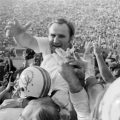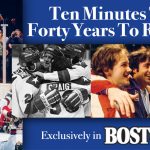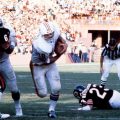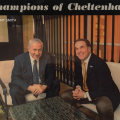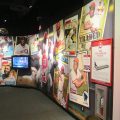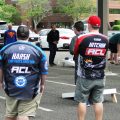Remarkable Humans

It’s A Dog’s Life – Animal Aid USA
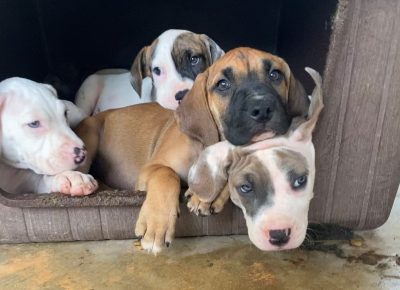
The volunteers at Animal Aid USA take a trip to rural Georgia every four weeks, to rescue stray and abandoned dogs and give them a home. To date they have rescued 40,000 dogs from unimaginable conditions. This story appeared in the spring 2023 issue of JerseyMan, you can read the magazine version here.

You want to give them names already, don’t you? (photo courtesy of Karen Talbot)
It’s A Dog’s Life
Our canine friends teach us one of the most important lessons of life: it’s too short for anything less than unconditional love, compassion and forgiveness, all the time.
Karen Talbot, Rachel Monaghan and the volunteers at Animal Aid USA have taken that lesson to heart. Their mission is to return the favor of unconditional love, to as many dogs as possible.
As anyone who participates in their rescue caravans can tell you, it’s a big challenge. Talbot herself says it’s not for everyone. “It’s grueling on that road.”
Animal Aid USA gathers volunteers, vehicles, water bowls, blankets, crates, and whatever else is needed, for a trip to rural Georgia from Williamstown every 28 days. They then gather abandoned dogs from local shelters in the area, load the dogs into vehicles, and take a 16-hour overnight drive back to New Jersey, to place dogs with no-kill shelters to be adopted.
A 64-word paragraph can’t begin to capture the level of effort involved in the operation. Monaghan, a regular volunteer, describes the process:
“We leave at 6:00 at night and arrive in Georgia around 9:00 AM the next day,” she explains. “Once we get down there, we prepare our vans with water bowls and line all our crates. If we have litters of puppies in our vans, we’ll extra line the crates, because we have to usually change them while we’re driving.
“That’s usually on a Thursday. Friday is when we do all of our preparation. In the morning, we’ll clean kennels again, and then we prepare for transport. We usually have about 30 crates in each van, we put in puppy pads and towels or blankets in all the crates. Karen tags them all, so we know which dogs are gonna be in our van. We prepare extra water bowls, extra towels and stuff to clean up any messes that happen.”
“At around 4:00, we start the load, we’re out of there by 5:15. Everyone’s just going in every direction. It’s like all hands on deck.”
Talbot, who spends much of her life preparing for the trips, likens it to a Broadway production.
“All of the preparation and the dress rehearsals and everything that you have to do lead up to one moment, and that one moment is “It’s load-up time”. That’s when everything has to be done done done, because the first dog in is gonna be in there the longest, and it’s all about getting them all in the right crates, and making sure everybody fits.
“Once they’re all in, we do our giant prayer circle and we’re off.”
The crew of vehicles with its precious cargo, including the rig mostly driven by Talbot’s husband Dante, then drives through the night…the only time D.C. traffic on I-95 is avoidable…back to New Jersey, where dogs are unloaded and placed with Animal Aid USA’s adoption partners. The project is both exhilarating and exhausting.
“Then you get home and you crash,” Monaghan laughs.
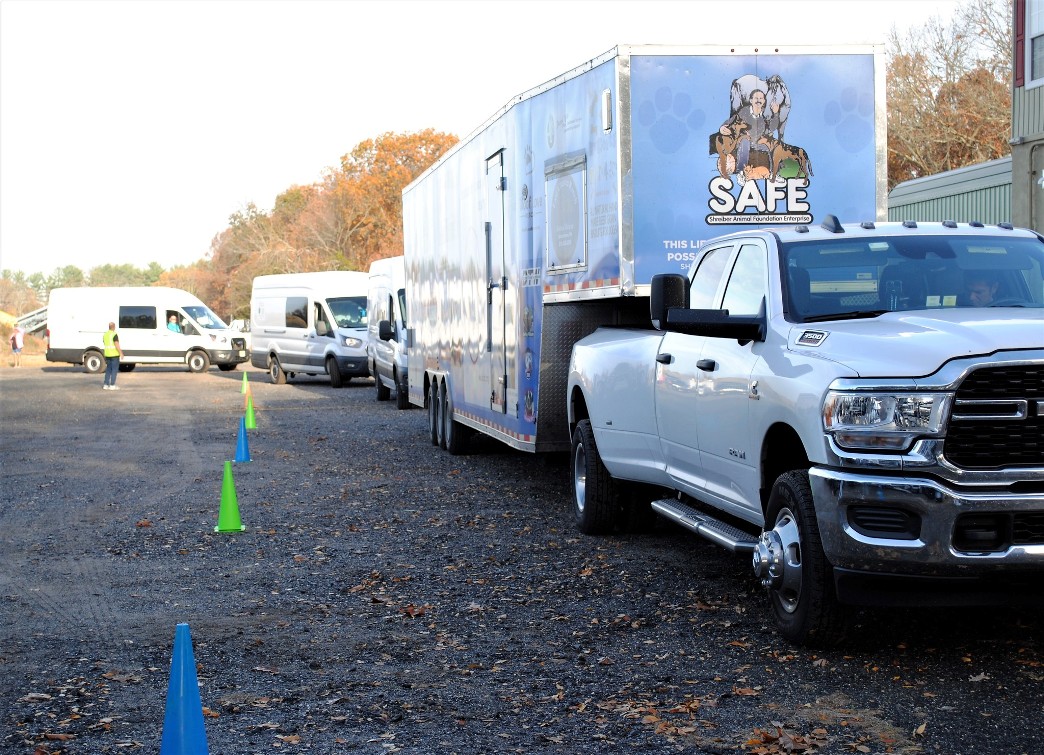
A truck full of dogs headed to be adopted in NJ. (photo courtesy of Karen Talbot)
So why rural Georgia, 16 hours away, every four weeks? Surely there are plenty of stray and abandoned animals in New Jersey?
Probably. But in Georgia and several other states, many rural counties don’t have the resources to care for stray dogs. Sadly, it isn’t often even for a lack of funding. There’s simply a different attitude towards dogs in the places where the caravan goes.
It was quite the culture shock for Talbot, as it would be for any animal lover.
“Animals are not viewed the way they are up here,” she says. “They’re not household pets, they’re not family members. They are yard dogs, they’re a nuisance.
“They don’t have the same empathy and compassion. The majority of people could care less about animals, and the minority of animal lovers are really fighting a bad war.”
She remembers witnessing how the situation reaches a tragically mind-numbing level for many people.
“When I first started going, I was so angry with them at first. Like, ‘Wait a second, you mean to tell me that you love animals, but you drove past a litter of puppies on the side of the road? What the hell kind of an animal lover are you?’
“But as I got to know these people, I realized they have 40 dogs at their house because they stopped 40 times, and now they can’t feed their families, now they don’t have food. They’re being threatened with eviction, they’re being threatened with divorce. They have to put blinders on, because sadly that’s where they live.”
Like all of the volunteers, after being a part of so many caravans, Monaghan has seen heart-wrenching stories of dog abandonment too.
“There was a case where, I guess the person went to jail, there were these Chihuahuas. The house had to be condemned. It was so disgusting, they were living in layers of poop and pee, it was just horrible. And again, the police, they didn’t want to deal with it.”
Monaghan laments that “All the shelters are pretty much kill shelters. None of them do public adoptions or rescue. If they’re not claimed by their owner, they usually get euthanized.”
Talbot describes the horrific conditions that dogs endure. “They’re not even shelters. They’re death holes. They’re a cinder block hut with a car port over top that they call a shelter. There’s no A/C, there’s no heat, some of them don’t get fed. They’re just there to hold until they’re killed.”
Hearing the stories can take an observer from “Why do people do all of this to rescue dogs?” to “How can anyone with a heart not do something?”
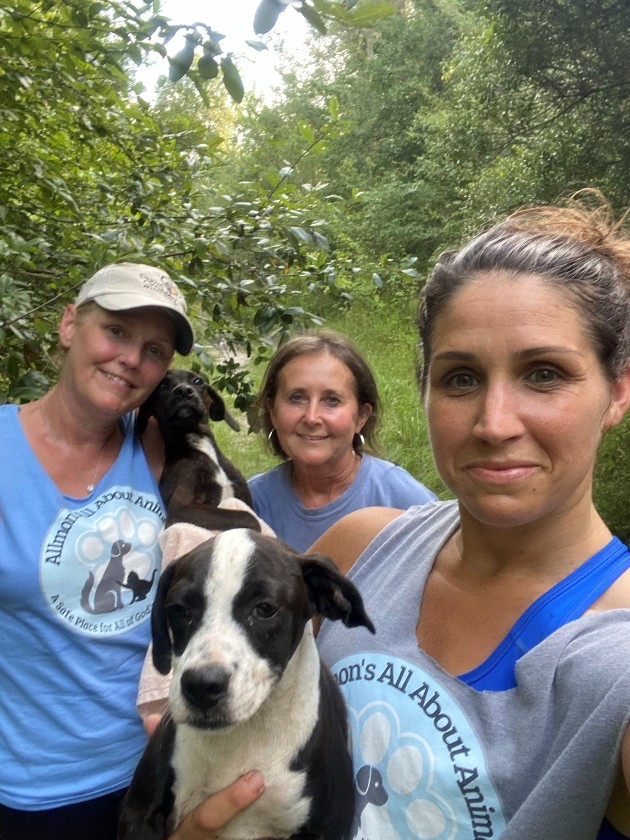
Rachel Monaghan (right) with a new bestest buddy. (photo courtesy of Rachel Monaghan)
In Rachel Monaghan’s case, she wanted to do something to overcome her grief after losing her own dog unexpectedly. She learned about Animal Aid USA through a friend, and has been hooked ever since her first trip.
“I was planning on going to three trips that year,” she remembers, “and I ended up going on I think six. I just became a regular caravan member.
“The best part for me is seeing the transformation. Obviously it’s awful what they go through, but seeing the resilience of them, and how they just still continue to love and trust people.”
Talbot says of the people giving their time to the caravan, “I’ve discovered that it’s not just them saving dogs. This movement has saved them. It’s saved their marriages, it’s stopped them from drinking, it’s made their life better at home. It’s their outlet to get away for a while to do something bigger than them.
“Nobody gets that until you come on a trip. Our motto at camp is ‘Our strangers leave as family’. And it happens to everybody. If you have a soul, it happens to you. It can’t not.”
In the face of a mentality that has existed for generations in this part of the world, Talbot and her team have taken on the most difficult of tasks: not just rescuing dogs…over 40,000 of them now…but also changing an established mindset that creates the need for their rescuing.
“You see it, in just the blank stares,” Talbot says. “People cannot believe that first of all, we would drive that far for a dog, and second of all, why?
“What we’ve learned is with our continuous journeys there, and the trust that we’ve built with these people. They know we’re not there to do anything except help. We want to change the next generation, we want to break this cycle, which we are.”
Talbot has seen that transformation in personal relationships, such as with a hardened animal control officer who now reaches out to Karen for help with dogs he finds.
“We laugh about it today,” she reflects. “When he first met me, he grunted at me, wouldn’t even make eye contact with me. I said look, I’m not here to point fingers, I’m here to help.
“A couple of years went by and he started to talk to me, he gave me his cell phone number. Then a couple of years later he was just like, ‘Hey, Karen, listen, I got so and so dog that just came in, you think y’all can take this one?’
“And this relationship blossomed. Plus some Tastykake cupcakes from up here helped too,” she adds with a chuckle.
Karen Talbot doesn’t spotlight her own role in rescuing dogs, even though it’s considerable. To her, it’s simply her life’s work. She always emphasizes the word “we” when speaking of the efforts of everyone involved.
“I had an idea, and I had a vision, but a vision is just a vision unless an army comes together to actually make that vision become a reality. We’re all volunteer, it’s just a life-long mission of ours.”
By providing the education, awareness and resources, she says, “We are empowering the next generation to make change in their world for companion animals. You’ve got rescue groups all over. But are you changing the mindset while you’re doing it?
“We are, and I think that’s what I’m most proud of.”
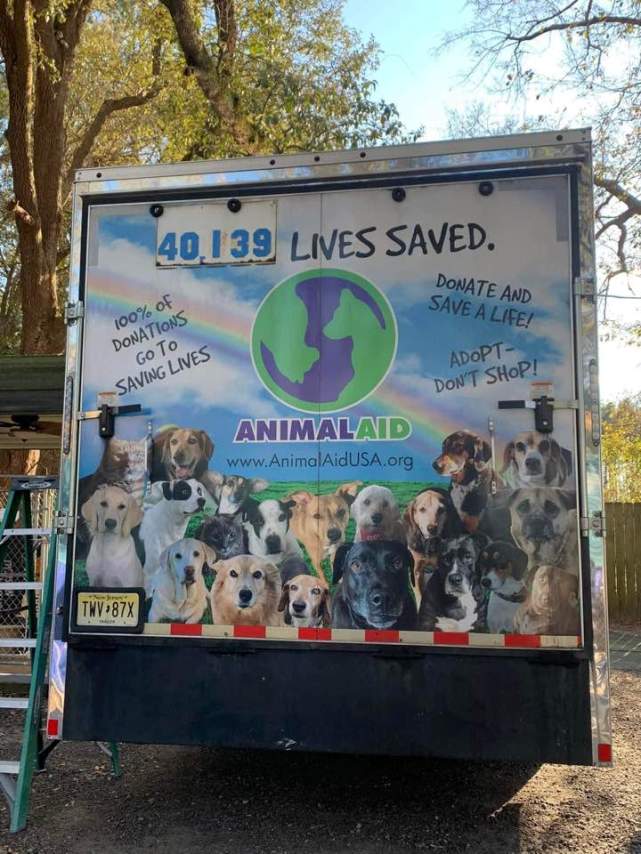
And counting. (photo courtesy of Karen Talbot)
An Animal Loving Bachelor
The rescue caravans at Animal Aid USA operated under different names in its early years, including MOMS (Making Of Miracle Stories) Rescue and Paws For A Cause, as Karen Talbot worked to raise awareness of dog rescues in rural Georgia.
Talbot fondly recalls the story of the huge contribution from Lorenzo Borghese, a name you may know…he was The Bachelor in the show’s ninth season. Borghese is an animal lover himself, and he wanted to help when he saw a documentary about the rescue operation.
As Talbot understood, his endorsement meant far more than a financial contribution he could have made.
“I was contacted by somebody who knew Lorenzo,” she remembers. “They wanted me to get introduced because (Talbot’s husband) Dante and I had started to take trips to Georgia. We went on our first trip in January of 2011, and on that trip, we had a borrowed van and we went down for 23 puppies.
“Once I met with Lorenzo, what I loved about him was there weren’t layers to get to him. He was the real deal, he reached out to me personally. I gave him a copy of the documentary which we had done.
“He knew that Dante and I were going back and forth to Georgia and funding everything on our own dollars and credit cards. Once he left our meeting he went home, watched this 25-minute documentary and was hooked.
“He said, ‘Are you looking for a check? Are you looking for money?’ I said, ‘No, I don’t want your money. I want something more important. I want a voice. People know who you are, they recognize you, they don’t know me.’”
Borghese suggested creating Animal Aid as an umbrella for MOMS Rescue, which he then lent his endorsement to. The “USA” was added when they learned that another “Animal Aid” already existed.
“That’s when Animal Aid was born, and so we incorporated Animal Aid is a non-profit. All the while, I still kept Making Of Miracle Stories, and Animal Aid just took off.”
Borghese adding his voice undoubtedly helped the effort. Talbot made a wise choice asking for it over a check…which she says would have been spent in a week and immediately forgotten.
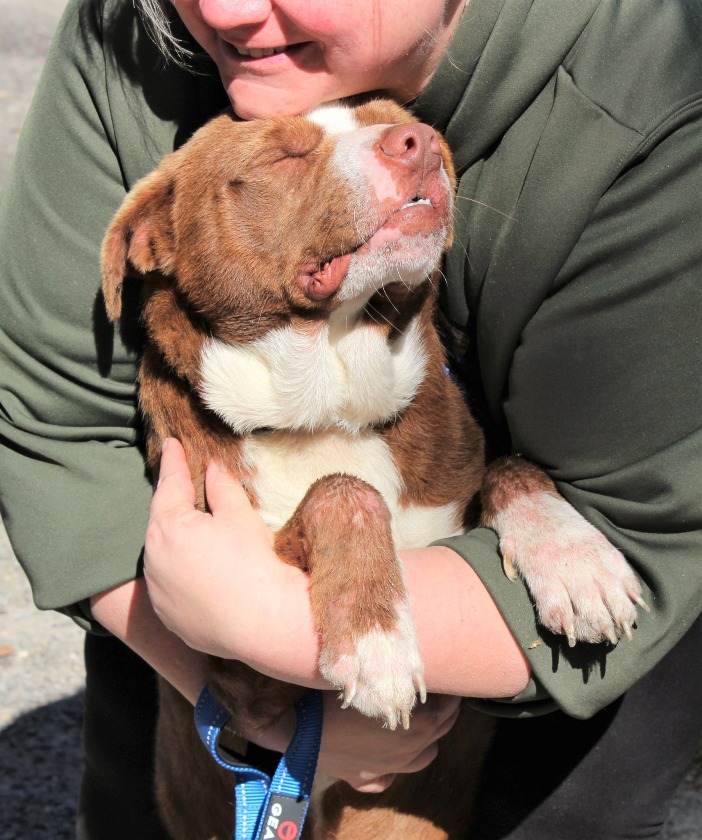
Being adorable in their natural state. (photo courtesy of Karen Talbot)
The Video
On the Animal Aid USA website, you can watch a video of their being featured on “To The Rescue” docuseries, with host Tommy Habeeb narrating the full experience of the caravan going back and forth from Williamstown.
The video shows the Georgia compound where dogs are held until the caravan arrives, as well as the medical facility where vets handle spays, neuters, and heartworm treatments. Habeeb hears about the entire process from Talbot, who describes the logistics from dog food deliveries to the 38-foot transport rig that holds 64 crates.
Throughout the video, you see Georgia dogs in their natural state of being adorable, making the work that Talbot describes as grueling seem not only worth the effort, but not difficult at all. But Talbot shares that people are exhausted by the end of the project, wondering what they’ve signed on for, until the sun comes up during the ride home and they see the light at the end of the tunnel.
The caravans could easily be a reality show, you might think while watching. But Talbot is quick to shoot down pitching the idea of a reality show to a network, as this writer suggested.
“It’s a real reality show every 28 days down there,” she says. “But for me, living it on a daily basis and being in Georgia…Rachel’s amazing, it’s not a bad idea for her to set up a YouTube channel with a following, where we are real and raw.
“You’re not getting raw in reality TV. And you’re also controlled, and it’s scripted, and I am the furthest from being controlled or scripted.
“They don’t like that at all!” she says with a laugh.
The video is well worth a watch…go here to see it.
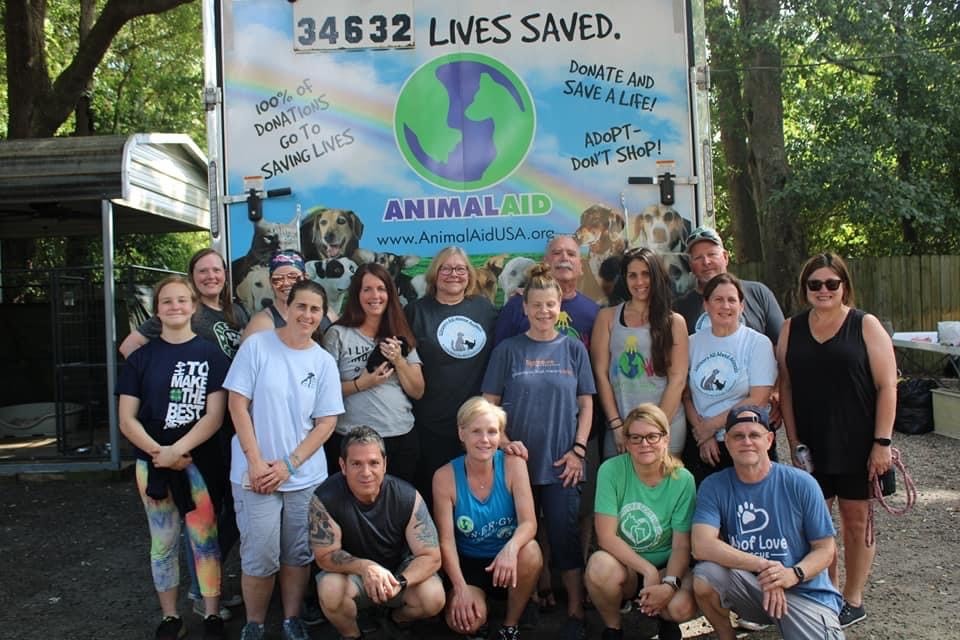
You are welcome to come join them. It’s life transforming. (photo courtesy of Rachel Monaghan)
Put It On Your Bucket List
Karen Talbot and Rachel Monaghan were happy to invite this observer to join them for a caravan trip. It’s something to consider, even if you just like long overnight road trips and need a worthwhile reason.
As Talbot says, the caravan has even saved marriages, and she cites her own as an example. Her husband Dante, who now drives and maintains the big rig of the caravan, had at one point tired of her devotion to the cause and requested a divorce.
“I immediately chose the dogs,” Talbot says.
“The following summer after the giant Georgia puppy caravan, we then had our documentary premiere in Philadelphia, and all the people that came on the caravan…the pilot, the rescue groups, everybody, was in attendance at the Trocadero.
“Dante was there because we were still friends, and he saw what I was doing from our bedroom on a computer, and he vowed to make it up to me the rest of my life if we got back together.”
The power of puppy faces. “It’s really funny because the reason we divorced was dogs, and once we re-married and got back together again, he’s worse than I am with dogs.”
Hopefully your marriage isn’t in need of helping dogs to save it, but if you’re interested in lending a hand and the life transformation that all of the volunteers speak about, you can reach out on the Animal Aid USA website and see if they need help with the caravans, which they usually do.
“Put it on a bucket list at least once in your life,” says Talbot.

The Magic of Mio
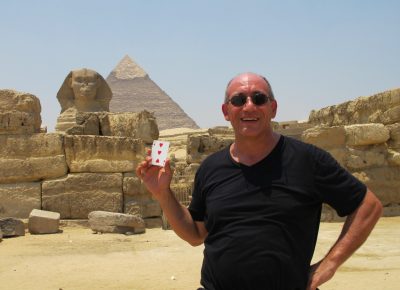
I was given the privilege of interviewing Mio Rodriguez, a magician and mentalist of very high caliber in the Miami area, for the relatively new MiamiMan Magazine. You can view the magazine on MiamiMan’s website here, or have a look at the PDF of the article here.
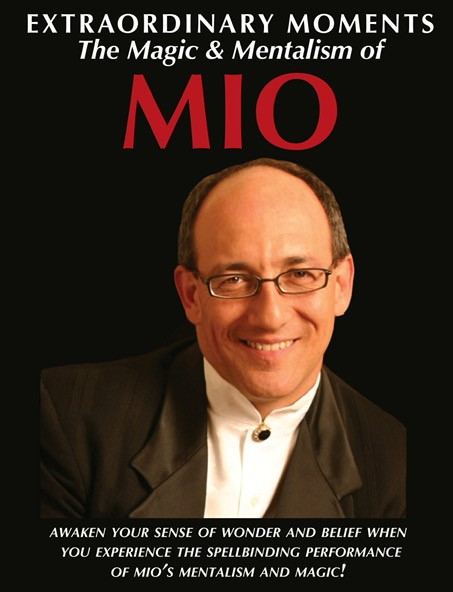
The Magic of Mio
Magic By Mio is a close-up magic and mentalism act that is mind-boggling enough to spread the word…even among some of the biggest stars in the world.
Mio Rodriguez is surprisingly polite while he makes your head explode.
Throughout our discussion, he repeatedly called this simple scribe “sir”, and thanked me for the interview in a truly sincere tone. He even threw in a brief performance free of charge.
Mio is unfailingly gracious and genuine…which, when you think about it, is an odd quality for someone whose career is about deception.
It’s a key component of not just his considerable lifelong success, but also being repeatedly invited to entertain some of the most well-known humans on Planet Earth.
Just for the record though, he’s really, really good at magic and mentalism too.
During the interview, he divined a digit I had mentally chosen from an eight-digit number on my phone’s calculator, and followed up by intuiting what I had just searched for on Wikipedia, guiding me with skilled patter.
It’s all tricks of course, but I was duly impressed…and couldn’t wait to play the recording for my children.
I’m not the only one.
Mio performs astounding card magic and confounding mind-reading tricks, both at an exceptionally high level. His goal is always to bring out the wonder we had as kids.
“I’ll do close-up magic, cards and coins in the cocktail hour, followed by a mentalism show after dinner. People come to me and say, ‘You know, the magic with cards was amazing. We didn’t see any sleight of hand, we just figured that’s how you did it.
“’But the mentalism…were you really reading our minds?’
“Mentalism is the new magic for adults,” Mio says. “They think they know how the card trick was done, but when it comes to mentalism, there’s still that childlike wonder…‘How the heck did he know what we’re thinking?’
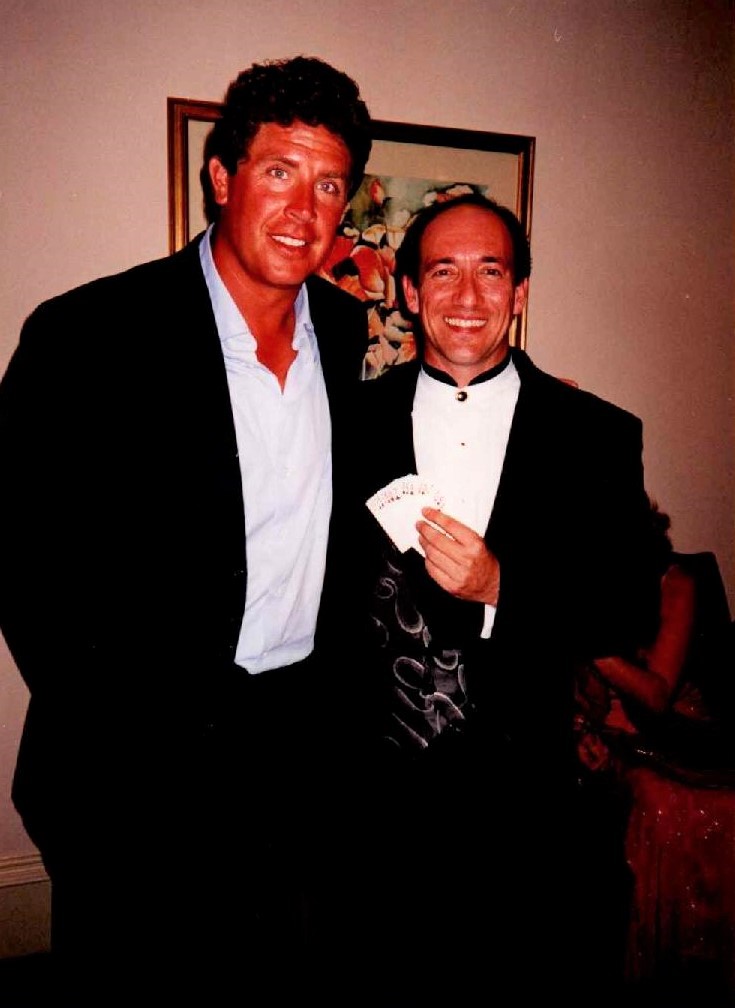
Baffling Dan Marino can help land a mentalist some prime gigs.
(photo courtesy of Mio Rodriguez)
Mio’s Magic and Mentalism Show is well known today…not just in Miami, but in the highly exclusive celebrity world.
The list of names Mio has dazzled includes not just Miami’s own Dan Marino, Shaquille O’Neal, Wayne Huizenga, and Don Shula. You can view many more on his website…Stallone, DeNiro, Jordan, Gretzky, and countless others.
It started with Marino, though. Or more correctly Mrs. Marino.
“His wife saw me at someone’s party,” Mio remembers about a fateful moment, “and she has me at a birthday party for Dan at the Signature Grand.
“He liked what I did, and he said, ‘I want you to come to my celebrity golf tournament.’”
At that tournament, Mio says, “I met Mario Lemieux, he said, ‘Wow, I love your stuff. Can you do my celebrity golf tournament in Pittsburgh?’ One of his guests was Michael Jordan.”
And so on.
Mio has plenty of amusing stories about entertaining celebrities. He remembers a Christmas gathering with Pat Riley’s Heat:
“Riley had seen me at a party, and he wants me to come to the Heat’s Christmas party. He liked it so much he hired me for 12 parties in a row.
“For the last four years I did the party, LeBron was there. The first three years, other players would bring me over: ‘LeBron, you gotta see this!’ He would be like, I don’t like magic, I don’t wanna watch. The fourth year, finally he goes, okay, let’s see what you got.
“I do my favorite effect, a signed card to a wallet. When I bring his signed card out of the sealed envelope, he was like, ‘oh my God, that’s too much.’
“I go, let’s do one more. I have an invisible deck in my hand. I throw it to him and say, take a card out invisibly, turn it upside down, and throw it back. He throws the invisible deck, when I catch it, there’s a deck in my hand. I go, ‘I caught a pass from LeBron James! Sir, what card did you put in upside down?’
“At this point, Pat Riley’s come over. LeBron says the king of spades. I spread open the deck and there’s a card upside down. When I turn it over, it’s the king of spades.
“And Pat Riley goes, ‘You got the King with the King!’”
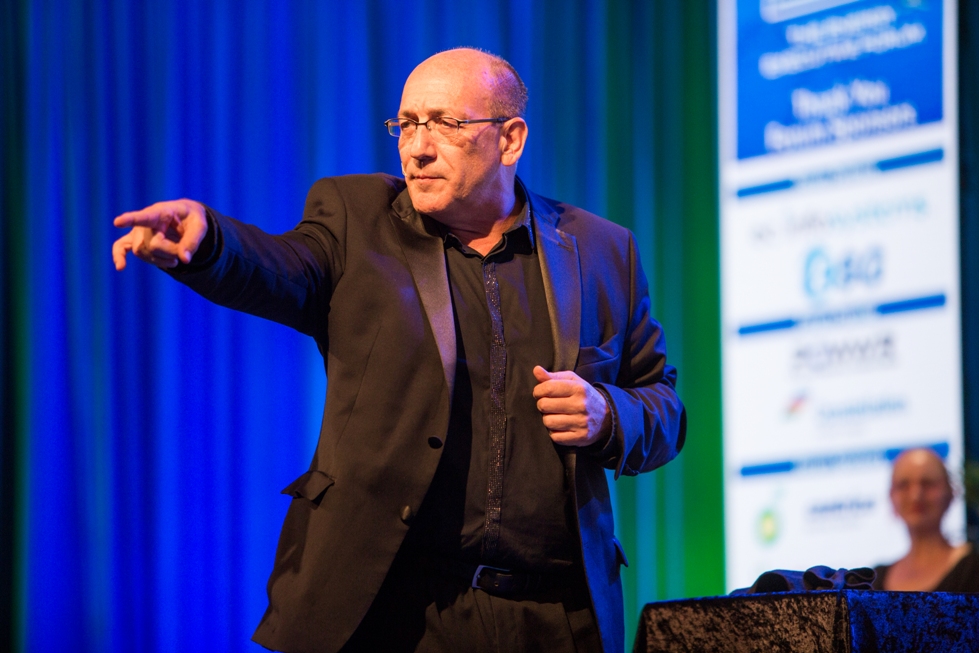
It takes years to develop this level of cool.
(photo courtesy of Mio Rodriguez)
It’s a fallacy that anyone is born to do anything, especially in entertainment. It discounts the deliberate intention to excel at a craft, and the persistence to convince others that your skills are worth a look.
Mio’s had life experiences pointing him to a career in magic, including coming from a show business family and performing in front of Mrs. Dan Marino. But he’s worked at it plenty, and he’s made his own breaks.
“My father was a professional costume designer and my mother was a dancer. In fact they met doing a show together. My father’s great love was magic, and although he wasn’t a professional, he was a very good magician. He would sit me on his lap and teach me magic with cards. When we would go to magic shows, he would tell me how things were being done.
“I just thought everybody’s dad knew, I didn’t know I was getting privileged information! I knew a few great card tricks, fun at a party or whatever, but I never thought of it as a career.”
But then one of those fateful nudges happened.
“A magician just happened to move in next door, who made a living at close-up magic. I’m like, ‘Wow, you can make a living?’
“He showed me an effect, and it turned out to be one my dad had taught me. I grabbed the deck and showed him my version, and he showed me his other version. Because I had some knowledge, he started sharing with me like I was a magician. He said, if you learn these seven basic moves of sleight of hand, you could be a magician.
“I studied and practiced, hours and hours a day for months and months. After about a year, I decided I was gonna try to make the transition and be a magician. I moved from Dallas to Florida in 1990.
“My friend was doing magic in restaurants; restaurant jobs are the basic fundamental stepping stone, the bottom rung of the ladder. I would come in Wednesday, Friday and Saturday, and go from table to table for a small salary and tips.
“Once I got those first jobs, I built off of those, then I started calling entertainment agents. I said, listen, I work at this restaurant, come in and have dinner, watch what I do and see if you like me. If you do, you can hire me for your private and corporate parties.”
A performer never knows when momentum is going to kick in. But years of hard work and making connections finally turned into “overnight success”.
“I gave my cards out for the first four or five years. Then one day I got a phone call: ‘I had your card for three years, we have a party.’ Then the next day I got a call, and then the next thing I knew I’m getting calls three, four, five times a week. All of a sudden business just exploded.”
“I’ve been working full-time for 32 years now. We’ve had a really great year here this year. People are coming back out of Covid, and it’s been some record numbers.”
Not bad for someone who started with a few card tricks at parties.
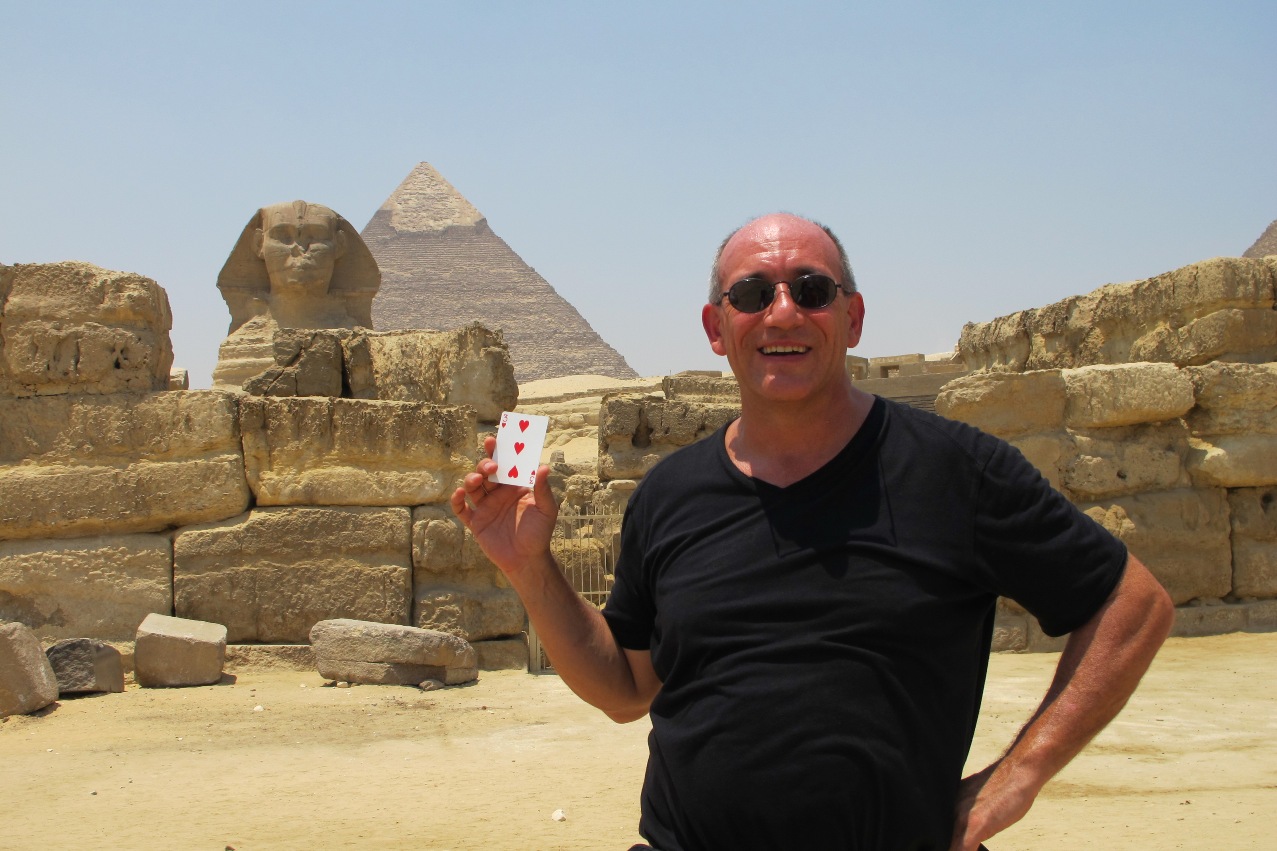
Entertainment that is welcome anywhere.
(photo courtesy of Mio Rodriguez)
As much as he enjoys the travel and performance life, Mio is planted in South Florida. It is, he says, a great place for a magician to call home.
“There’s a lot of corporations, conferences, and also parties, bar mitzvahs, all kinds of events. People come here and want to do something fun. Florida has a lot of people that have the ability and desire to have these parties, and they want great entertainment.
“I love Florida, the sporting activities, the fishing and the water activities. Even though it’s hot in the summer, the weather is overall fantastic. You’re not locked in. There’s so many opportunities here. It’s just a fun place to live.”
It’s an admirable lifestyle Mio’s carved out in the Magic City. He does quite well performing at corporate events, celebrity parties, and on cruise ships. His well-honed act sends him across the country…including Las Vegas, where magicians can be easily hired without travel expenses.
His lovely assistant…his wife Rhonda…performs a much more important function for Magic By Mio, Inc. than getting sawed in half. She handles Mio’s promotion, marketing, contracts, and the rest of the business end, so Mio can focus on staying on top of his game.
“It’s helped bring our business up,” Mio gratefully acknowledges. “She sends out all these email blasts and marketing that remind people of us, and they call us back, it just makes everything much more professional to have her.
“One job leads to another, because word of mouth is my strongest method of promotion. I don’t advertise. With the website there’s SEO, that’s the only thing I pay for.
“Things are newer, but back in the day, it was all word of mouth. And it still is.”
Those who have witnessed The Magic of Mio would agree. Just ask Pat Riley.
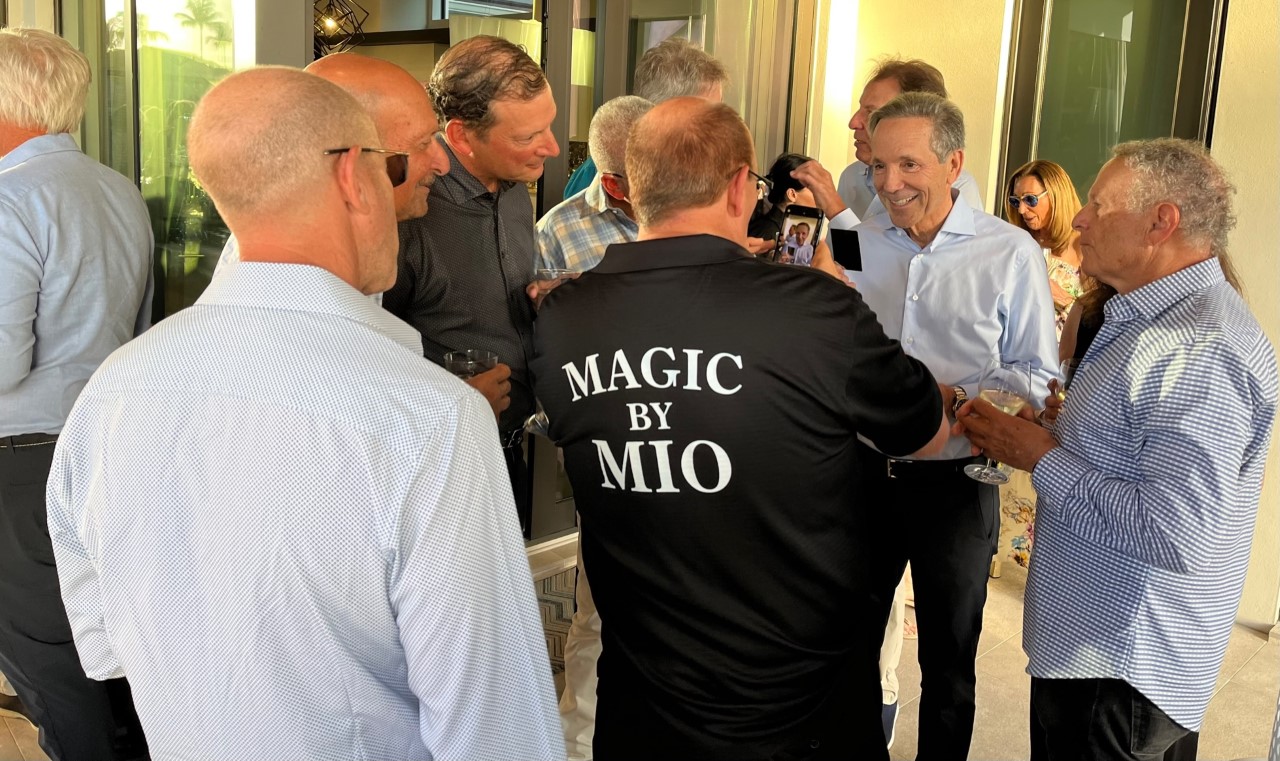
Magic that draws a crowd at your event.
(photo courtesy of Mio Rodriguez)
If You’re Interested…
MiamiMan probably doesn’t need to point out that if Mio is good enough to work the Heat’s Christmas party for over a decade, that his skills are exceptional enough to perform at a corporate event.
But he’s very easy to get a hold of, in case you’re interested…there is a contact form on his website, and his direct cell phone number is prominently displayed online as well.
You should probably contact him well ahead of time, though. Mio estimates that he performs about 145 shows a year, and many of those gigs put him on flights. The list of cities where he performs include Chicago, New York, Los Angeles, San Francisco, Washington, and many others, and his list of corporate clients includes IBM, Citibank, AT&T, UPS, Walgreen’s and many, many more.
You get it; Mio is in high demand…for his skills obviously, but also for his professionalism.
“For corporate, you want a really top rate entertainer who’s sophisticated. There’s a lot of CEOs, high level people, they’re spending a lot of money, and they don’t want anything hokey. They want to make sure they have a sophisticated entertainer who’s on a higher level, because they’re often wanting to impress other people.
“That’s what they get from me, and that’s one of the reasons I’m busy with so many corporate events, because once they find that out, the word also travels as well.
“I’m able to take care of their clients a professional, sophisticated, classy way, and that’s what they look for.”
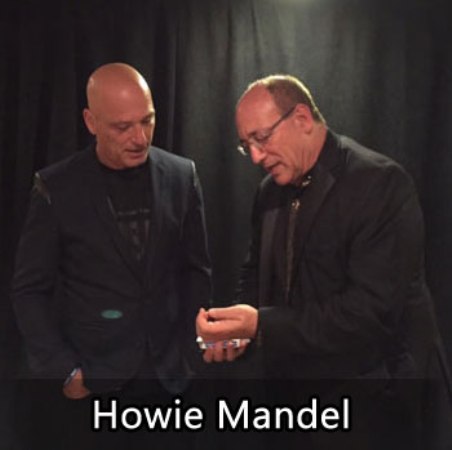
Deal or no deal?
(photo courtesy of Mio Rodriguez)
As (Almost) Seen On TV
Mio Rodriguez just missed…twice…on capturing nationwide audiences on a level where he could add a “notoriety fee” to his performance price. He auditioned for both America’s Got Talent and Penn & Teller’s Fool Us shows, and just missed making it to the show both times…for reasons that had nothing to do with any lack of ability or skill.
“On America’s Got Talent, they called me up and wanted me to come on the show. I was doing mentalism in the audition, and they told me, ‘You don’t even have to wait in line. We want you to come audition for us.’
“We rehearsed in the morning, and I had two or three mentalism effects that were ready to go, but the producer or the director at the time had never heard of mentalism, and he kept skipping me. They just didn’t really understand what mentalism was. Now, of course they do, they’ve had mentalists get to the finals.
“What they actually ended up doing was choosing another magician who wasn’t very good. He was triple-X’ed off. I guess they needed, I don’t know, some humor on the show. It really upset me to the point where I didn’t try to get back on it.
His exclusion from Penn & Teller’s Fool Us is even more inexplicable.
“Penn & Teller, before they had their show, they were at one of those conventions in Vegas, and they saw me do some moves with the cards. They said, man, that’s the best we’ve ever seen. We want to film you, because we’re doing a documentary about the convention.
“They never did do that show, but in the meantime, I auditioned for Fool Us. They said, here’s the date of filming, make sure your calendar is open.
“But in the end, they never called me back.”
It’s unfortunate that America hasn’t had a chance to see Mio’s act on television. Mio has had audience members tell him that he’s as good as David Blaine. And more personable.

“Wait, what?”
Women in Magic (Yes, They Exist!)
Have you ever given any thought to why you have seen so few female magicians? In fact, you may not have even given it thought…in terms of magic performance, you might simply be accustomed to women in sexy clothing, climbing into a box to get sawed in half.
There is a post on Mio’s website about this phenomenon and how magic is one of the rare fields that has not yet been fully infiltrated by the fairer sex. In it, he references the iconic “We’ve got a witch!” scene from Monty Python & The Holy Grail. As humorous as the scene is, Mio says, “its implications are quite horrifying.”
“Throughout history, up until the 18th century in fact, accusing women of practicing witchcraft and heretical sorcery was often a near-instant death sentence.”
In modern times, Mio notes that “many parents and relatives make assumptions about the interests children will take up based on gender. Men are encouraged to pursue fields like sports and sciences based on gifts like athletic equipment, chemistry sets and magic sets. Women, less so.”
But Mio says this is changing, and points out an inspiring success story in particular.
“I have a good friend who is a magician, and he gave his niece a magic book when she was 13. She loved it, she started learning magic, and she declared at a young age, I’m gonna have a show in Vegas when I grow up, I’m gonna be a woman magician who has a show in Vegas. Lo and behold, she just celebrated her 500th show last week.
“Her name is Jen Kramer, and she’s one of the few women magicians right now that have a big show in Las Vegas. She basically created that for herself, she manifested that by saying, yes, I’m gonna be a magician, I’m gonna have my own room in Las Vegas.”
“That’s the kind of orientation, goal setting and tenacity that it takes for a woman, let alone a man, to do that.”
You can learn more about Jen Kramer at her website.

Being Relentless – The HEADstrong Foundation

The story of the founding of the HEADstrong Foundation is both heartbreaking and inspiring. I interviewed Cheryl Colleluori, the president of the Foundation, for Winter 2019 issue of JerseyMan. She is a remarkable, exceptional human being…a true warrior and survivor. You can read the article on JerseyMan’s website or you can view the PDF of the article here.
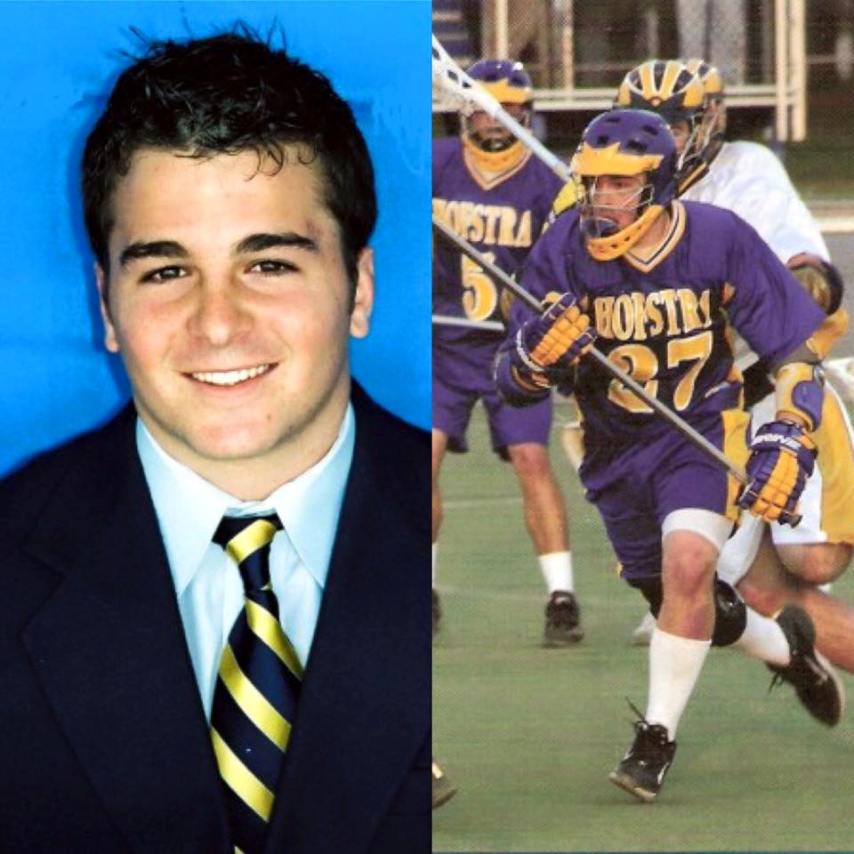
Nick Colleluori, the founder of the HEADstrong Foundation. (photo courtesy of Cheryl Colleluori)
Being Relentless
The HEADstrong Foundation is the brainchild of Nick Colleluori, who lost his life to cancer at the age of 21. Like Nick, the Foundation is relentless in helping patients and families affected by the disease.
Nick Colleluori sketched out the HEADstrong Foundation logo on his way to an operating room, in the midst of his battle with non-Hodgkin’s lymphoma.
His mother, Cheryl, remembers it well.
“He asked me for a piece of paper and pencil. I didn’t have a paper and pencil, but I gave him a napkin and he just started doodling. I wasn’t even paying attention. My husband and I were sitting there talking, trying to remain calm, giving him that assurance that this was going to be okay.
“They’re wheeling him in, and he turns the napkin around and said, ‘here’s the logo.’ I said, what are you talking about? He said ‘the logo for the Foundation. I’m starting it.’
“I thought to myself, man, this kid is relentless!”
When the 19-year-old three sport athlete was diagnosed with the disease that ultimately would take his life, he wouldn’t spend a minute letting anyone feel sorry for him.
“He made it really easy for us,” says Cheryl, who is now president of the Foundation. “He made the whole journey just very bearable, if you can imagine that. He was so upbeat, and you would never ever see a frown on his face. I felt very privileged that I was his mom.”
Nick spent his 14-month fight…which was 11 months longer than doctors initially anticipated…noticing every resource that was lacking for cancer patients and their families. Challenges like financial help, a place to stay during treatments, and the need for understanding and support. As his mother says, at a time when he could have been selfish, he chose to help others instead.
Today the HEADstrong Foundation he founded is doing just that, in a huge way.
They connect patients with survivors to speak with and mentor them through the ordeal. They host events and provide entertainment for patients throughout the year, including an annual Thanksgiving feast at the Hospital of the University of Pennsylvania. And patients coming to Philadelphia for treatment can stay in Nick’s House, in either of two locations in the Philly suburbs.

Nick’s House in Swarthmore, PA, a beautiful place to be, especially in the fall.
The idea for Nick’s House was born out of the Colleluoris visiting NIH in Bethesda, Maryland, for a clinical trial.
“We were in an 8×10 room and there were seven of us,” Cheryl remembers. “We were on sleeping bags. We were so grateful, but it was not conducive for a long term living arrangement. We met a family living out of their car, which is not unusual. We thought, let’s do something.
“Our first Nick’s House was born seven years ago, and we refinanced our house to purchase this house. It took my husband six, seven months to renovate. The second home in Swarthmore opened in February after one year of renovation.
“We’re not just children, we’re all ages. Pediatric, geriatric. We are all cancers. And the common theme is that they’re traveling a distance of 50 miles or more, and they’re coming here for an extended period of time. Nick’s House becomes their home. They can read a book, be part of the neighborhood, go for a walk, you know, they’re in a safe and secure environment.
“I just love it. I’m so proud of it. The greatest gift for me is seeing complete strangers become one family.”
That the Colleluori family has been there is their greatest asset in helping other families.
“When people come to Philadelphia for treatment, they’re leaving behind everything they know. We become their family and their support system. We are very family rooted, hands on, in the trenches with the families. We are that family. We were that family. We understand everything that they’re going through.
“I get this a lot: When will I know, when should we make the decision, if things aren’t going well? And my response is, you’re going to know. I also say, don’t go there until you have to.
“A lot of times the minute you hear the diagnosis, oh my God, my child’s going to die. Well, guess what, we have seen hundreds of children that are still here with us, that have made it, that have survived. My message to other parents is keep positive no matter how bad it gets, and don’t go there.
“That little bit of information was shared with me, because I went down that path too. You hear the word cancer and you’re just in such a tailspin. You don’t even know what to do next.
“One of the greatest compliments I’ve ever received was from a mother of a terminally ill child. She held my hand and looked into my eyes and says, you are my role model. Those are the only five words that I ever need to hear, to know that she can see me standing still. I’m still standing.”
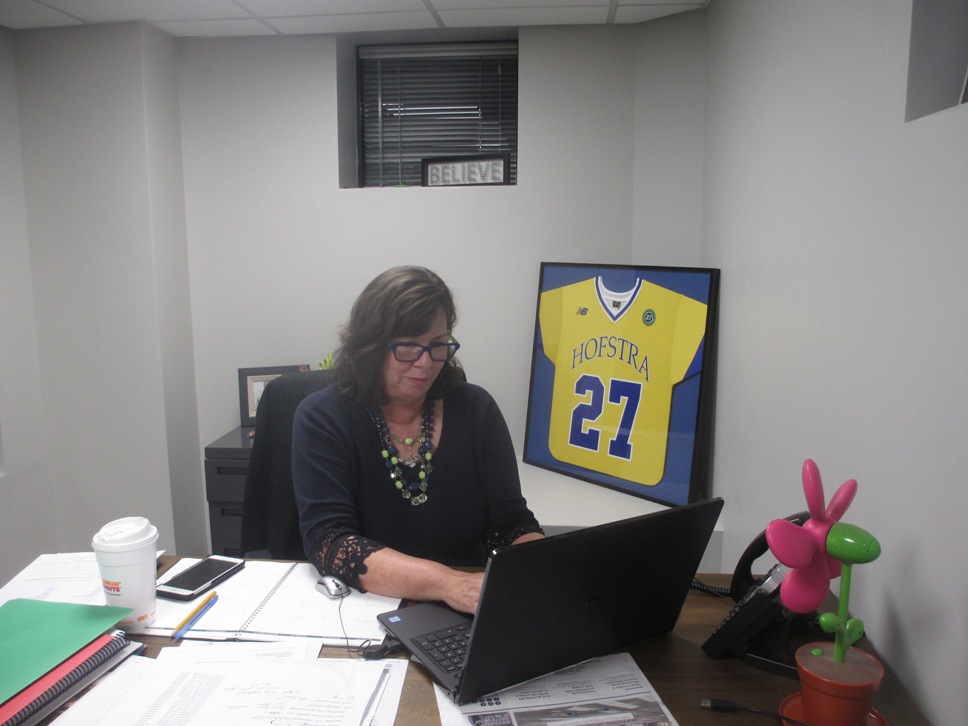
Cheryl Colleluori, with her son’s uniform providing the inspiration.
Cheryl Colleluori is never afraid to be human. She has no problem choking up and occasionally pausing to gather herself, even while speaking with a writer she’s never met over the phone. But in mere seconds she is back in the game, speaking of the goals of the Foundation. “Be relentless” is its motto.
JerseyMan has profiled dozens of successful entrepreneurs. They almost always speak of the importance of getting back up again. That there is no substitute for perseverance.
If you want to see an example of someone who relentlessly gets back up, it’s Cheryl Colleluori. She is still going strong every day, meeting with patients, consoling them, supporting them every way she can. Like her son, she’s as great a teammate as you could ask for.
There are, of course, moments. The blow life dealt her was enough for her to faint dead away in her first visit to a hospital, to distribute “Comfort Kits” to cancer patients.
“I stepped out of the elevator and passed out,” she remembers. “Because all of a sudden what hits you is the smells, the sounds. You know when you’re walking into the room. I was thinking, I don’t know if I can do this.”
But she did. Because her son’s relentlessness still gives comfort and hope to thousands. Cancer may have taken his life, but even now, he won’t let it beat him.
After Nick’s passing, the family was so heartbroken that they sought a medium to possibly bring them some comfort. Cheryl says that to their surprise, the medium knew things that no one could have known, including details about Nick and his girlfriend of eight years, Jordan, exchanging wedding vows the night before he passed.
“The medium said to me, ‘your son is telling me that you are his mouthpiece.’ When I got the phone call two days later to speak, my husband said you can do this for our baby. That was the start, and the rest is history.
“He is guiding us. There’s no doubt in my mind that he is still providing the direction and my inspiration.”
When the doctors could do no more for Nick and sent him home, he took the car keys from his devastated father and let his mother drive. On the way home, he spoke with her about his final wishes, including for Cheryl to take HEADstrong as far as it could go.
“He said, Mom, look into my eyes and tell me that you can do this for me. His exact words to me were, ‘I want other people to benefit from my life.’
“How do you say no to that?”

Helping The Foundation Stay HEADstrong
The HEADstrong Foundation has been an enormous success since the passing of its founder Nick Colleluori in 2006. They have raised over $14.4 million and have assisted over 15,500 families affected by cancer. In addition to two Nick’s House locations that can simultaneously host eight families, they served Thanksgiving meals to five floors of patients in 2018, have hosted dozens of fundraising events and have delivered hundreds of their “Comfort Kits”.
But as Cheryl Colleluori will tell you, it’s not without challenges. Nick’s House requests are frequently coming in, as more families travel from hundreds of miles away for specialized treatment that is only available here. She notes that there are 280 families a month in need of housing just in Philadelphia.
Families at Nick’s House are charged nothing for their stays, which can often be 50 days or more. This is in addition to their financial grants for families struggling with costs, dinners and events, and the multiple other services HEADstrong provides to families.
“We want to have the greatest impact we can in Nick’s name,” Cheryl says. “We want to help as many people as we can, and make sure we have the right people in place that bleed like we bleed, that breathe like we breathe. We have a lot of people that we’ve helped that have lost their loved one and they now have an opportunity to set up fund in that loved one’s name, and paying it forward for the next family. And that’s been a nice opportunity of growth for us.”
Nick’s House and the HEADstrong Foundation subsists entirely through volunteers, partnerships and donations. If you’d like to contribute or volunteer, you can find out how at https://headstrong.org.
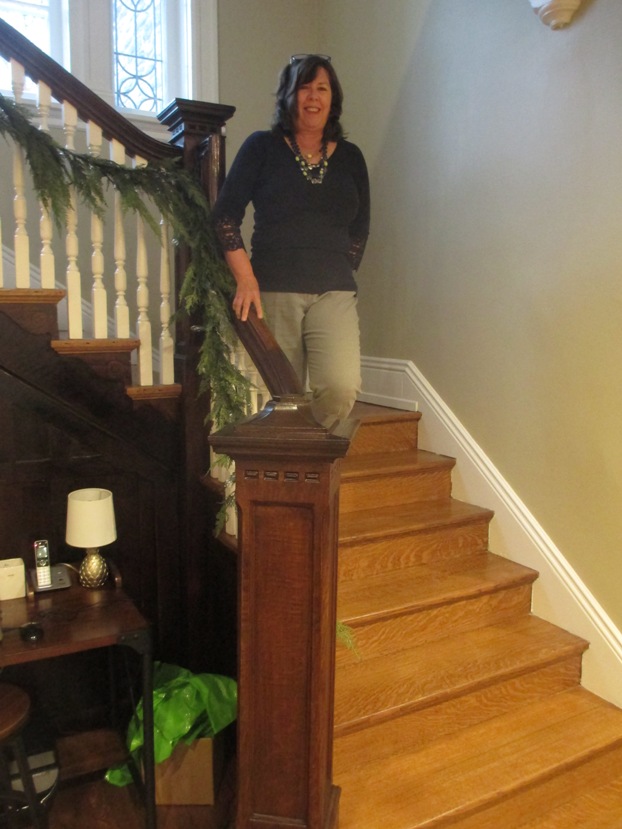
Cheryl in Nick’s House, bringing hope to those who most need it.
The Comfort Kit
One of Nick’s innovative ideas for helping cancer patients was borne out of the experience of being on call for hospital visits. It’s called the “Comfort Kit”, and the HEADstrong Foundation regularly delivers them to cancer patients.
“A lot of times when someone’s admitted to the hospital,” Cheryl says, “you need to report right now because there’s a room available. Or, you’re in the emergency room and you’re admitted on the spot. You don’t have anything with you from home.”
The Comfort Kit includes a set of items that people without experience in this realm probably wouldn’t think of, as she explains:
A journal and a pen – “2:00 in the morning you wake up and ‘oh my gosh, is this normal? I have a question for the doctor. Am I going to remember?’ There’s your journal, jot the question, write it down.”
A blanket – “It provides warmth and comfort and it personalizes the room.”
Tissues with aloe – “Tissues in the hospital are so paper thin.”
A toothbrush and toothpaste – “A soft bristle toothbrush, because toothbrushes in hospitals fall apart when you use them.”
A gift card – “I don’t have any money and I need to get out of the parking lot. Or, I could really go for coffee, let me run down to the cafeteria. Oh darn it, I don’t have any money. Well, don’t worry about it, because there’s your gift card.”
Information about HEADstrong’s Peer Support – “You just never know when somebody’s losing it on the floor and they want to talk to somebody.”
Comfort Kits are hugely appreciated by patients, Cheryl notes. “It’s just a great way to enter somebody’s room and say, hi, how are ya? I’m Cheryl Colleluori with the HEADstrong Foundation. I’m thinking of you today and I hope this makes you smile. I hope that you know that there’s somebody here fighting for you that you don’t even know. A lot of times people are like, I was hoping you were going to come, I heard about this!
“I get great reward out of bringing a smile to someone’s face and my team. We go down with about 15 volunteers, and every one of those volunteers are survivors that I met as I handed out their comfort kit.”
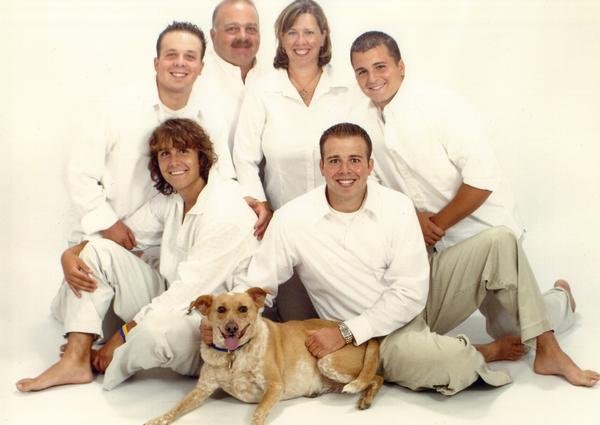
The Colleluori family, the best teammates you could ask for. (photo courtesy of Cheryl Colleluori)
The Mental Game
The HEADstrong Foundation’s Peer Support program connects survivors and family members to share their deepest and most private concerns. Generally they will find a survivor of the same age group and background to speak with a patient or family member.
“My sons are very involved,” Cheryl says. “They talk to siblings, my husband talks to dads, I talk to moms and dads, and the peer support is not over when someone passes. If the person’s gone a couple of years, it doesn’t mean the relationship with the HEADstrong Foundation is over. We’re still very highly involved with families.”
HEADstrong is relentless in helping people stay as upbeat as possible. But Cheryl absolutely understands that it’s almost impossible for patients not to get down sometimes. “There’s a lot of sadness. We cry right with people.
“We try to talk about other things. We try to get people’s minds off of the fact that their health is declining. If somebody wants to talk about it, I will, we understand. Nick was tired, we know. But if we get somebody’s mind off of it, they forget. A lot of it is a mental game.
“In two weeks, we’re going to the Sixers game, and we’re taking 26 people with cancer with us. We do the programs in the hospital, we have people in wheelchairs and oxygen, and IV poles. They’re getting blood and getting chemo and we bring them into the room and have a magic show, or we play bingo. Or we have jazz night and they’re singing and clapping. If it’s for an hour, we’ve just improved their mental state.
“We’ll do art therapy. One guy, I’ll never forget, he was so weak. We took him back to his room and the next thing we know, he’s back. The nurse has got him back at the door and I said, are you okay? He’s like, ‘I have to finish this for my daughter.’
“He finished the painting, and I took him back and he said, ‘can you place it right there for me? I’m going to take a picture, I’m going to send it to her.’ He said, ‘you’ve given me the motivation I needed to get the heck out of here and get home to my daughter.’ We still keep in touch with him today.
“It’s just those little things to help people get through the darkest days.”
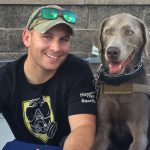
Surviving Until Tuesday – Sergeant Andrew Einstein
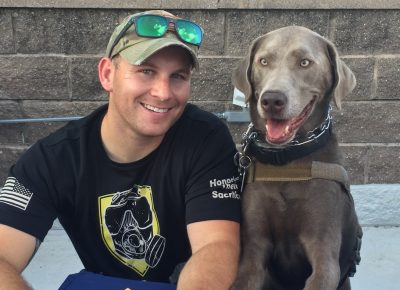
Andrew Einstein is one of our nation’s true heroes, yet he was driven to the brink of suicide resulting from a head injury and lost sense of meaning. JerseyMan sent me to interview him as he told me what real strength was to him. You can read the article on JerseyMan’s website here, or view the PDF of the article here.
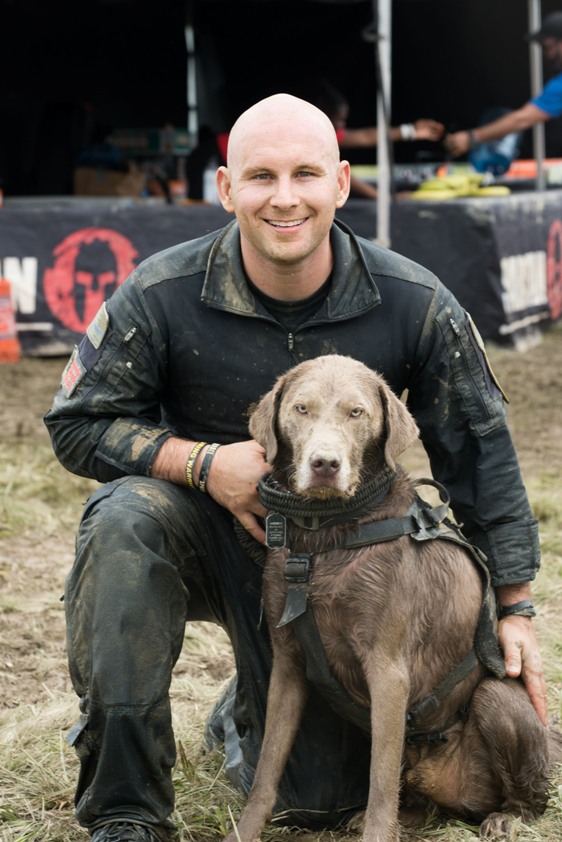
Sergeant Andrew Einstein with Gunner, the Silver Labrador who was there to save his life. (photo courtesy of Andrew Einstein)
Surviving Until Tuesday
Camden County Police Officer and U.S. Marine Sergeant Andrew Einstein speaks openly about being on the brink of suicide, pulling himself out, and living a life with purpose again.
On August 5, 2011, in the Sangin Valley region of Afghanistan, Sergeant Andrew Einstein of the U.S. Marine Corps sustained a brain injury from a grenade attack.
He didn’t think it was a big deal at the time.
“Kids would throw rocks at patrols and stuff to mess with us,” Einstein says. “I remember looking down and going, it’s just a rock. I saw there was an Afghan soldier, and his eyes were just like…I looked back down and said, oh, that’s not a rock. As I went and turned to get away from it, I got a couple of steps and it went off.
“I remember grabbing my ear, my ear hurt so much. I yelled, I fell into one of the rooms. I crawled out and that same Afghan soldier, he was wearing a white shirt, he fell to where I was and his white shirt was red.
“I remember being really confused. I said, why is his white shirt red? He obviously had received some shrapnel, and I put a tourniquet on one arm and then I went to put a tourniquet on another arm. They took care of him, and I sat back and lit a cigarette.”
He wasn’t bleeding, he didn’t lose any limbs, and he had no bullet holes. Just migraines. To Einstein, it wasn’t a “real” war wound…especially happening on the same day that fellow Marine Daniel Gurr was killed.
He was, he knew, ready to get back to the fight.
A country that values freedom never has enough people like Andrew Einstein wearing military uniforms. But as it turned out, the injury was a big deal. Less than a year later, it was a contributing factor in his decision to end his life.
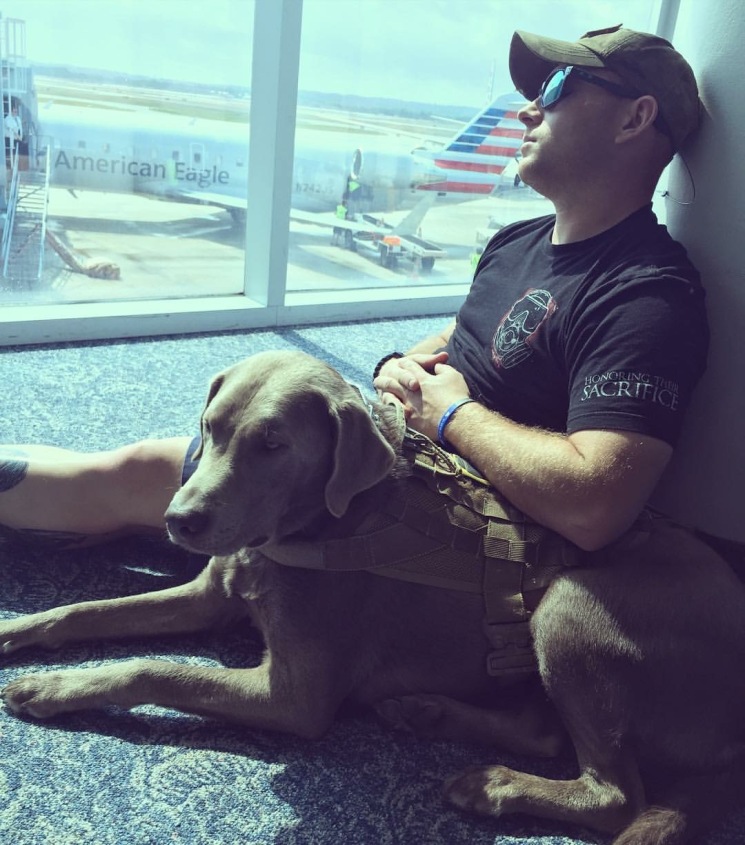
Einstein with Gunner, keeping him in the fight. (photo courtesy of Andrew Einstein)
That, and a lost sense of meaning back home.
“Coming home feels great,” Einstein says. “Then you realize that life went on, and you’ve got to figure out how to get back into your old life. And then comes a time, at least for me, where I said, I want to go back. I need that responsibility and that purpose that I had over there.
“I know the head injury really caused a lot of issues. The biggest issue was the hearing loss and then the memory issue. I was afraid that if I got help, they would take my badge and gun and say, sorry, you can’t be a cop anymore. I’ve been a cop since I was 18. That’s all I know. And I love being a cop. Aside from being a Marine, this is my life.”
As Einstein increasingly saw it, it was a no-win. Fight your losing battles alone or give up the responsibility. As time went on, the stress of what he perceived to be a meaningless life continued to mount.
By May of 2012, he couldn’t take it anymore.
“I wrote letters to my family. I’ll never forget what I wrote to my youngest sister. I apologized. Because up until that point, she looked at me as this hero. I was her brother, a police officer, a Marine who went over and fought for our country. I said, I’m sorry for lying and making you think I was so much stronger than I actually was, and I’m not a hero. I’ll never forget writing that because those words were the hardest.
“I put the bottle of pills next to my bed. I went out and drank so much that my friends plopped me on the couch. No one knew that 15 feet into the bedroom there was a bottle of pills that I’m planning to kill myself with. I remember waking up the next day, and I was disgusted. I couldn’t even kill myself.”
The date Einstein picked to be his last was fortuitous. He wanted the new dog he had agreed to pick up the following morning to have a loving home, and not be his family’s responsibility. After failing his suicide attempt, he went to pick up the dog.
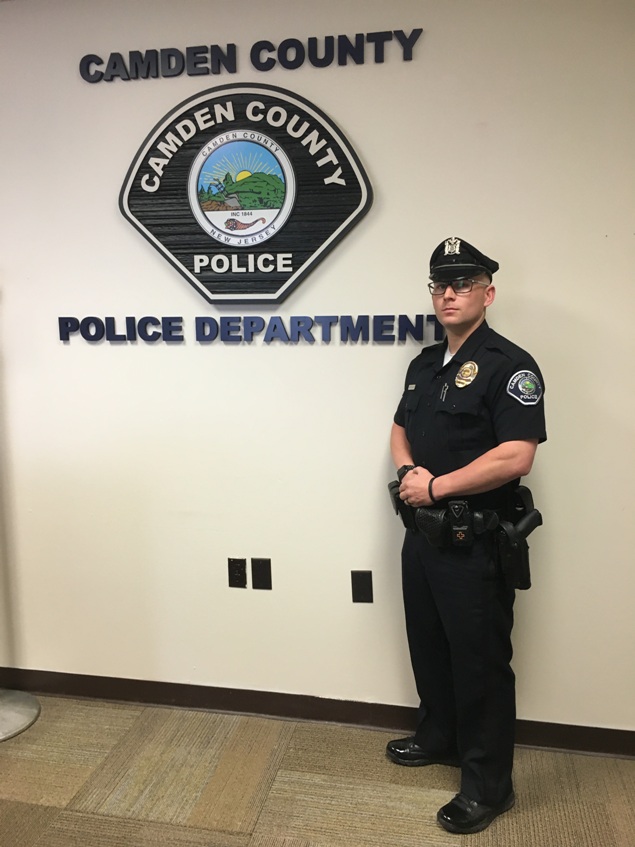
Officer Andrew Einstein at the office.
It turned out that Gunner, his new Silver Labrador, didn’t need a loving home. He needed a purpose too.
“As soon as I picked the dog up, I said, ‘I can’t kill myself, because I’ve got to be there for this dog now.’ All of a sudden I had responsibility again. Even when I was still doing the things I was doing, he was there for me. He didn’t judge, he didn’t care; he loved me. He would lay right on me.”
Einstein gives Gunner credit for saving his life. But he soon caught another break when his chief at the Riverton Police Department, John Shaw, could see he wasn’t well.
“He said, I don’t want you to lose your job, and I want to help you. I said, well, if he’s reaching his neck out for me, who am I not to try and get better.
“I went to doctors, I started going to groups and talking about the issues. My dog and I went into training, so he could become a service dog for me. It was definitely two steps forward, one step back, but each step, it got brighter and brighter. It took time, but we just started getting better and life became better.
“You always say, if you could talk to your 18-year old self. If I could talk to my 2012 self, I’d say, ‘Get off the couch and go get help. You can do this.’
“I’m telling you this is strength…raising your hand and saying, ‘I am not okay. I need help.’ One of my biggest things that I speak to now is with the first responder community, when there’s bosses or administrators to understand how or what to do if they have one of their personnel go: ‘I’m not okay.’
“However bad it is in your life,” he adds, “I can’t tell you when it’s going to get better. Hopefully it’s the next day. In reality, it’s not going to be the next day, or the day after that. But if you fight to get better, I promise you at some point, it will get better.
“I tell people, if you’re going through something, not just suicidal, you’re going through a gray dark time. If there’s something in your life that you enjoy doing, whatever it is. If once a month, every second Tuesday you’re going to play basketball with your friends, and you know that in that hour you’re totally relaxed and everything is great?
“Live to that Tuesday. Because you know each second Tuesday of the month, you’re going to have that hour of peace. No matter how bad your life gets in between, live for that Tuesday. And then live again for the next Tuesday.
“If you only have that, live for that Tuesday.”
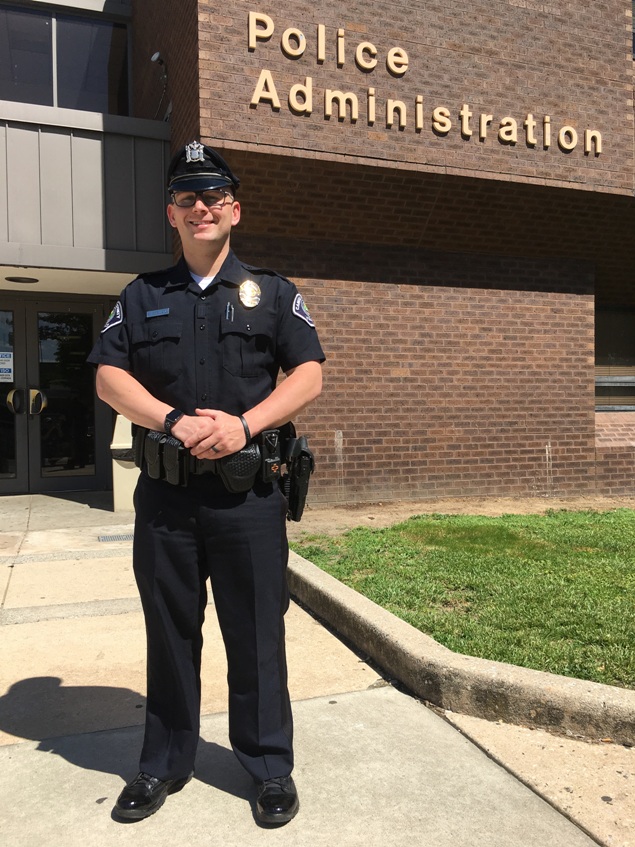
Serving the community, with his own experience.
Andrew Einstein is no longer surviving until Tuesday. He is now an officer in the Camden County Police Department, where he uses war and post-war experience to break trust barriers with city residents.
“One of the first things they said was: we know about your story and we want you to tell it, because we want you to help others.
“In this city, we have people in crisis every day, and these people have lived hard lives. I have to break the barrier, the same barriers I had to break in Afghanistan, to show them, look, I know I can’t relate to your life. But let me in, open the door a little bit, let me show you that I’m here to help.
“We try to de-escalate the situation as quickly as possible, and when someone’s in that moment, I can say, hey, hold on. I’ve been there. Guess what, May 5th, 2012, I was where you were.”
“I love getting the bad guy off the street. But I also love talking to the person in crisis or the person who just wants to talk. Dealing with the people here, it’s not all about busting the bad guys. Sometimes it is about throwing the football with the kid on the block or playing basketball. It’s showing the people that you serve, that you’re a person.
“I don’t say being suicidal helps you become a better person in the long run. It’s you take what life dishes at you and you learn from it.
“What I’ve dealt with in life, I’ve been able to use to mold into a better life.”
Today, the city of Camden has Officer Einstein and Gunner to thank too.
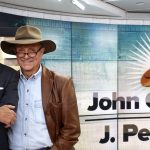
The World’s 7th Most Interesting Man – John O’Hurley
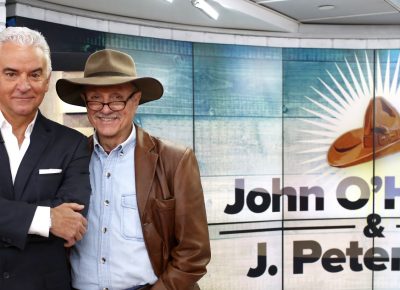
You may remember him best as the off-the-reservation J. Peterman, Elaine’s boss on Seinfeld, or as the host of Family Feud for several years. But John O’Hurley has done a lot of other cool stuff too.
I was fortunate enough to interview him for the June 2016 issue of JerseyMan, and he couldn’t have been cooler, giving little ol’ me almost an hour and a half of his valuable time and even sharing a Firesign Theater reference. You can view the PDF of the article here.
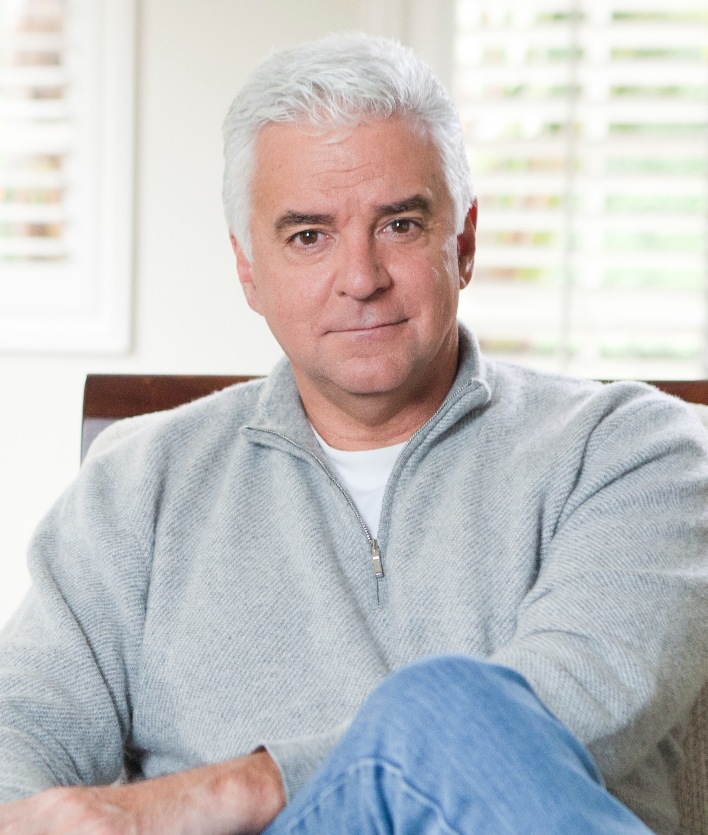
John O’Hurley, the World’s 7th Most Interesting Man. (photo courtesy of John O’Hurley)
The World’s 7th Most Interesting Man
John O’Hurley doesn’t sit still very often, but when he does, he has an extraordinary life to reflect on.
The first time John O’Hurley read a Seinfeld script, he instantly saw the genius of the Show About Nothing. Even if he didn’t consider it genius at the time.
O’Hurley had to be nudged to play off-the-reservation catalogue owner J. Peterman…a role that, given his own eccentric demeanor and storytelling ability, he seemed born to play. When he gave in and read the script, he couldn’t believe that Seinfeld was the number one show on TV. Because the show didn’t read funny.
Imagine reading a classic Seinfeld dialogue and it becomes obvious what O’Hurley means.
“It was the un-funniest show to read,” the portrayer of the now iconic character remembers. “There’s no setup. If I showed you, say, a Golden Girls script, you can see, setup setup setup, punchline, setup setup setup, punchline. Generations of script writers lived off of that form.
“Then Seinfeld came in, it grew out of standup comedy, observational humor. It was basically the notion of being in an elevator, that is New York, the sense of small spaces and rudeness and everything is always on edge, relationships or whatever. It was all about conversation, because everybody talks in New York. That’s why Peterman existed, because he was not only about language, he was about the long form. The writers got to write monologues every week, rather than writing one or two lines for each character.”
If you’ve ever looked at a J. Peterman catalogue (yes, J. Peterman is a real person), you can see why it appealed to sitcom writers whose strength was dialogue. A typical entry reads like this one, for the “Grace Under Pressure” cotton T-shirt: “MI6 operatives sat at noirish watering holes with Gestapo and Portuguese secret police, all waiting for the other to reveal the whereabouts of the Nazis’ cache of gold or an allied shipping lane. Wealthy refugees negotiated the sale of their art collections. Prostitutes doubled as informants. You’ve heard of Casino Royale? That’s this place.”
That’s the real J. Peterman. It was as if the character’s lines wrote themselves.
“They wanted him to sound the way the catalogue was written,” O’Hurley recalls. “They didn’t even have the full script written, because it was the most disorganized show on television. So all they had was the catalogue and a couple of lines. I’m going through this and thinking, OK, this is 40s radio drama and bad Charles Kuralt. So it had this sort of Centurion poet standing on a cliff type of feel about everything. Even a walk to the men’s room was an adventure. (imitating Peterman voice) ‘I have no idea what I’m going to find serving a basic desire!’”
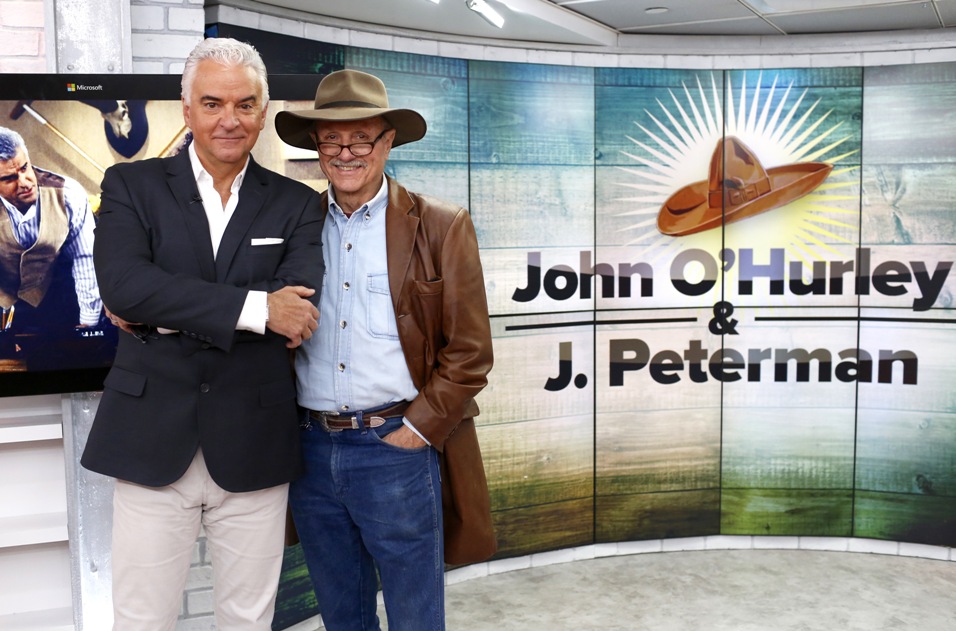
Seinfeld’s J. Peterman, with the actual J. Peterman. (photo courtesy of John O’Hurley)
The J. Peterman catalogue not only still exists, it’s part owned by O’Hurley now. The two men have walked on Madison Avenue together and heard New Yorkers shout “Peterman!” at O’Hurley, ignoring the in-the-flesh Peterman.
One of the catalogue’s newest offerings is the Urban Sombrero, in an ongoing and humorous Kickstarter campaign that has raised $96,000 as of this writing.
In case you haven’t seen that episode, the Urban Sombrero is an invention Elaine conjures up when the chronically unstable Peterman breaks down and runs off to Burma, leaving the company operations in Elaine’s hands.
The Urban Sombrero…a hat that combines “the spirit of Old Mexico with a little big-city panache”…turns out to be a colossal flop, to the point where Elaine overhears men on the subway talk about how the Urban Sombrero ruined their lives. In the show, Peterman himself reacts to the idea with similar distress, muttering “the horror…the horror”.
Indeed, if you were working for a clothing firm and heard someone suggest the idea of an Urban Sombrero, you might imagine you were in a Seinfeld episode. It took 20 years of cajoling from the fictional Peterman to persuade the actual Peterman to make this essential skypiece available.
What caused the eventual change of heart?
“I think he finally realized that at some point he was going to have to embrace the Seinfeld audience of 80+ million and try to draw them across the aisle into the Peterman world. There was a little bit of unconscious reluctance to accept them. When you think about it, I’ve basically stolen his identity; I’ve become his company. All of a sudden this poor man has nothing left, he’s lost his identity. He never understood, I don’t think, the Seinfeld phenomenon.”
Pop culture reverence aside, for us Philly area folks, O’Hurley points out the advantages of the Urban Sombrero as an ideal Jersey Shore accessory.
“It’s the absolute answer to the SPF problem. When you can’t decide between 15, 30, 60 or 70 and you go, oh my God, what do I choose? The Urban Sombrero. And not only that, it says, I think I’m gonna take a nap. Why not do it with a little bit of a panache?”
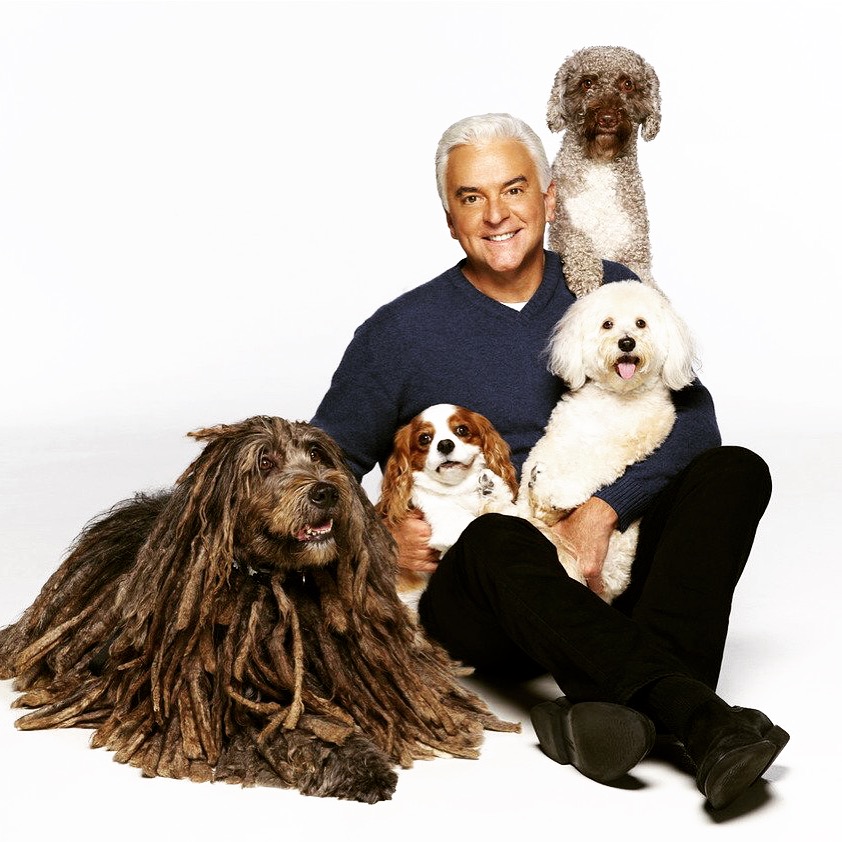
O’Hurley with several best friends. (photo courtesy of John O’Hurley)
O’Hurley spends time in the Philadelphia area each year, hosting the National Dog Show in Oaks that has become almost as much of a Thanksgiving Day tradition as the Macy’s parade. The National Dog Show was created way back in 1879 by the Kennel Club of Philadelphia; O’Hurley has been hosting it since 2002.
Like the Peterman character, it seemed an obvious choice to make O’Hurley the emcee of the show. Coupled with his game show host experience, he has an exceptionally thoughtful appreciation for canines. He’s authored three books about dogs and their impact on our lives; “It’s Okay To Miss The Bed On The First Jump” is a New York Times bestseller, and “The Perfect Dog”, a children’s poem, has been adapted into a children’s musical that is now part of National Dog Show Week.
“If you have a dog in the room,” O’Hurley relates, “everyone comes and pets the dog. If there’s a dog in an elevator, everyone is looking at the dog. Whatever the natural behavior of the dog is, everyone is going, awww. They calm us down; they round the edges in our lives. They take the brittleness out of things. That’s what dogs do.
“If you’re around 2,000 of them, and they don’t care if they win, everybody else seems to be happy so they’re happy. And they’re appreciated, and they know it, and there’s a sense of energy that they know that something important is going on. All of those things lead to just a great environment for everybody.
“It is the happiest day of the year. It’s as simple as that.”
The well-traveled host not only says nothing but nice things about visiting Philadelphia, he can do so without even dropping the name of an iconic sandwich shop.
“My favorite thing about Philly is the authenticity of the history there. The actual documents, walking around and actually being in arm’s reach from some of the most important legislation that was ever done in this country, the Constitution and the Declaration of Independence.
“I did the musical ‘1776’ many times, and I think that every time I pass that building, that they all stood in and sat in, and how sweaty that must have been and how miserable they must have been, and yet to put their names on any one of those documents was basically signing a lynching mob. I think of that every time I pass that building…my goodness, the courage they had to do what they did.
“On top of that, I love walking up and down the streets, and seeing the preservation of the areas. I love staying in some of the little boutique hotels. We love Oaks too, mostly because my wife refers to Nieman Marcus as the mothership out there in the King of Prussia Mall, which is the best place in the world to shop.”
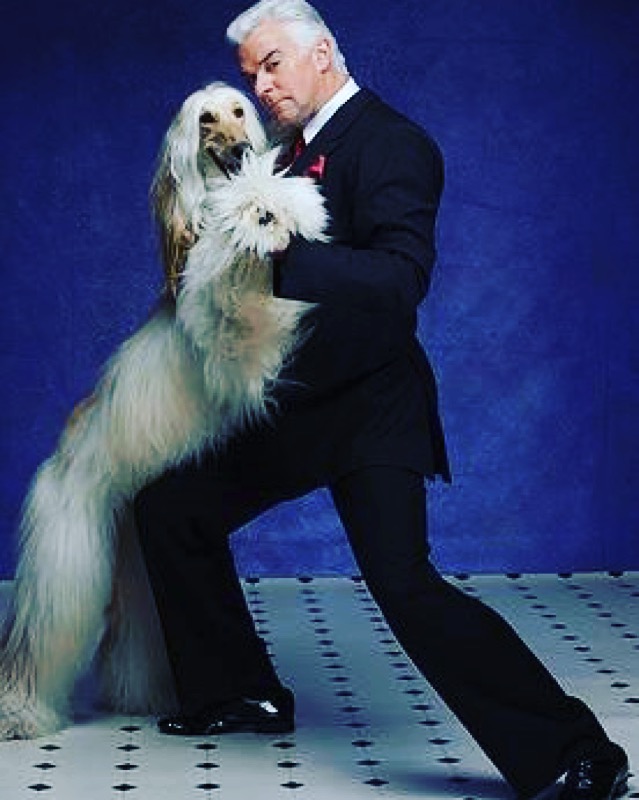
No, this wasn’t his dance partner on Dancing With The Stars. (photo courtesy of John O’Hurley)
You don’t have to be a Seinfeld fan or a National Dog Show viewer to have seen John O’Hurley’s visage frequently.
He is a theater star who has played King Arthur in Monty Python’s Spam-A-Lot and currently still plays Billy Flynn in the long running musical Chicago. On stage, he possesses a fine singing voice. Tom Williams of Chicago Critic opined it best: “John O’Hurley brings a big voice and a commanding presence.”
He is a self-taught classical pianist who has released several acclaimed CDs, and is now starring in his own creation called A Man With Standards. “It’s my one-man show of the music of the period when I grew up, a period of time when men had standards. It’s basically piano, and I expanded it all the way up to a full orchestra. It’s fun. I have all these melodies in my head, I’ve got to get rid of them somehow. It’s a dangerous place up there.”
He has ballroom dancing skills too; he made it to the finals of the first season of Dancing With The Stars, and winning a dance-off following a hotly disputed (to say the least) loss in the original final.
And he was probably the most elegant host of Family Feud in the history of the show.
“I’d worked with them on a show previous, called To Tell The Truth. You remember, will the real so-and-so please stand up. They were looking for a new host for Family Feud and I said yes. It’s a different style of hosting; with To Tell The Truth I sat down, I had a nice little thing to read with a story, panelists, that type of stuff. With Family Feud, there’s no script, you are literally out there hoping the net will appear.
“That was when I began what I call the prayer. I say God, let me be surprised. That’s all I say, and that’s what I say before I go on stage. It relaxes me to say that I’m not in control of this thing, so I can go out and relax. It was like hosting a cocktail party, we really cared about the fact that all these people came to your party.”
Last but not at all least, he’s the father of the first ever third-grader Vice President of his school. According to O’Hurley, at the age of nine, his son had already mastered the art of persuading people to eschew politics as usual…which at the school meant voting for a sixth-grader…and won in a landslide.
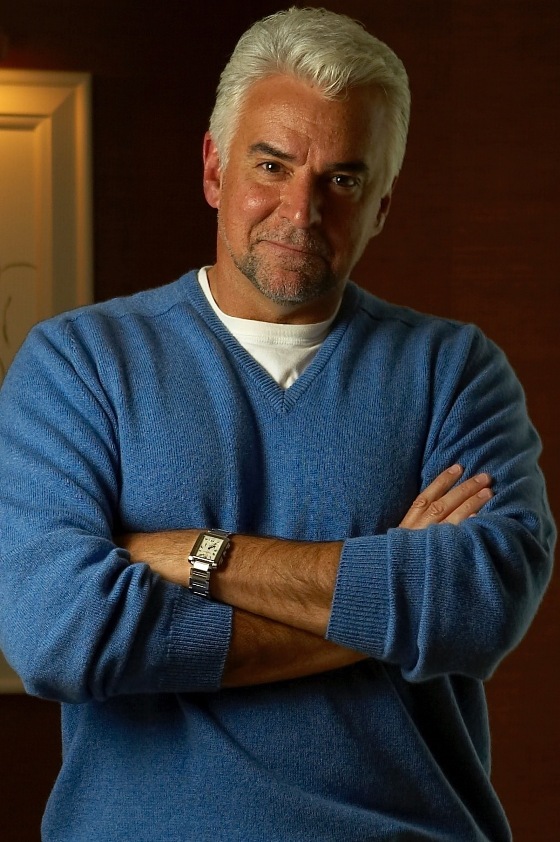
John O’Hurley, author of The Peterman Guide to Living an Extraordinary Life. (photo courtesy of John O’Hurley)
On his Twitter account, John O’Hurley proclaims himself to be the World’s 7th Most Interesting Man. When asked who #1-6 are, his answer is no one specific. Just that there’s probably only six people in the world having a better day than he is.
It’s a humorous worldview of a good-natured optimist whose attitude has taken him far. But truthfully, it’s a challenge to think of many people who have led more interesting lives. Not many of us have been a recurring character in the most popular sitcom in history, hosted national game shows, emceed a National Dog Show, made it to the finals of Dancing With The Stars, written three books, played leads in traveling hit musicals, and released several CDs of classical piano music.
Someone hosting a success seminar could paraphrase that old cliché: You have the same 24 hours as John O’Hurley. Or they could attend one of O’Hurley’s own motivational speeches; he does that too. He calls his presentation The Peterman Guide to Living an Extraordinary Life.
“I wake up every day with this goal: I have to find a way to stay relevant every single day of my life. And what I live by is this premise, and this is what I speak about: you have two choices in life. You can have an ordinary life, or you can have an extraordinary life, and it has nothing to do with power or money; it has everything to do with the power of your choices.
“God speaks through imagination. He puts pictures in your mind of what you’re supposed to be doing. Your rational mind knows everything you’re afraid of, and it has an agenda, but your imagination? No agenda. It only knows the best of what you are capable of, and it always pushes you forward to the next thing you’re supposed to be doing.
“I’ll talk to hedge fund guys on Wall Street, two thousand people in the room, and every one of them is taking notes, and I love that. And I say, if you do not believe that what you imagine has value, what I would ask you to do right now is put your pencils down, get up out of your chair, drop to the floor, curl yourself in a little fetal ball, and wait there for the sweet embrace of death. Because you will not improve your life one iota unless you value what you imagine, not what you know.
“And everyone picks up their pencils and starts writing again.”
“I’m very, very lucky, I’ve been in the right place at the right time, but all of those things I did, I did because my imagination said, I’m supposed to do this.”
With all respect to Jonathan Goldsmith, it’s a shame that O’Hurley didn’t star in the ‘Most Interesting Man In The World’ spots. The Dos Equis people would have had a lot to work with.
“He was once asked to star on Seinfeld…and proclaimed the script unfunny.”
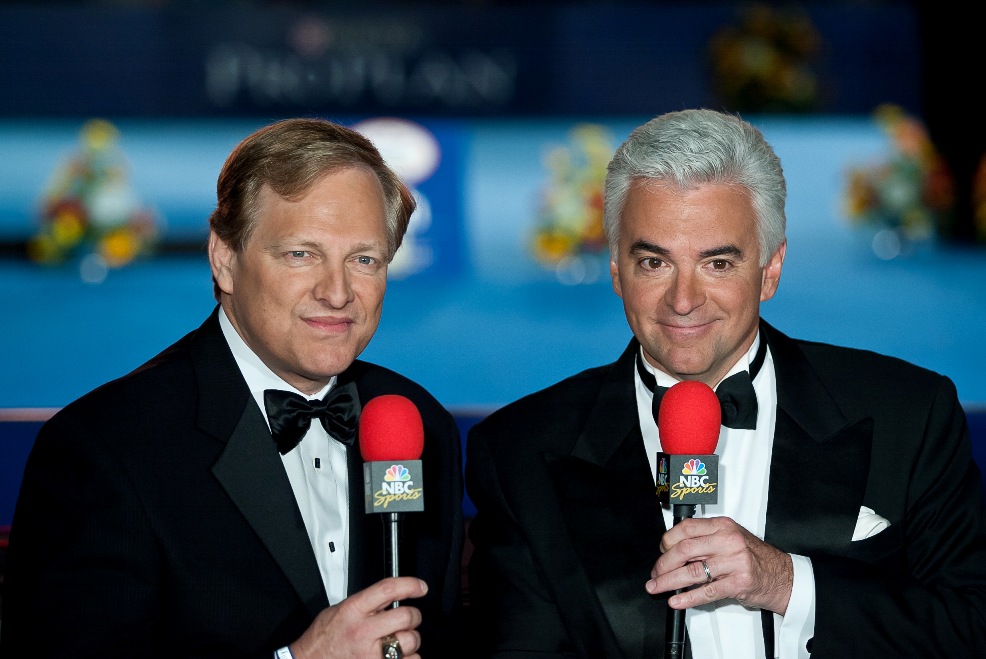
Uh-oh…someone just gave Peterman a microphone! (photo courtesy of John O’Hurley)
The Peterman Monologues
For many years the Seinfeld audience didn’t get to see much of J. Peterman at his maniacal finest…delivering a lengthy monologue.
“Every show was ten minutes too long,” O’Hurley says. “The first thing to go, we’ll cut the Peterman monologue. These things that I’d spend two and half hours on. I used to orchestrate them musically, because having studied opera I could play with my voice, and I would take it and rise (raises pitch of voice) and then hold, and then fall (drops pitch of voice).
“I would do that because this man was always a piece of walking poetry. Mr. Magoo-style poetry, but poetry nonetheless. He was a walking literary time bomb all the time.”
O’Hurley’s all-time favorite was in an episode where he incorrectly suspects that Elaine might be having a fling with a co-worker, and he encourages them with tickets to a circus. He still remembers the monologue verbatim:
“Don’t worry, Elaine. I too am no stranger to love on the clock. As a young man, my father apprenticed me to a honey factory in Belize. The chief beekeeper was this horrible hag of a woman with nulled teeth and a giant wart that she called a nose. She was not attractive, even by backwoods standards. But love is truly blind, Elaine, and as the days went on, working closer and closer together, that sweet smell of honey in the air; I knew I had to have that horrible creature. And I did. So you and Bob have a good time tonight.”
It may be an exception to the show’s script not reading funny, but that classic, sadly, was also cut from the show. O’Hurley says you can watch some of the monologues on the Seinfeld DVDs.
“They put a good many of them back in, because they’re funny. I actually hosted the presentation of the DVDs. They decided when I talked about that, oh we gotta go back and add that.
“It was just lunatic stuff.”
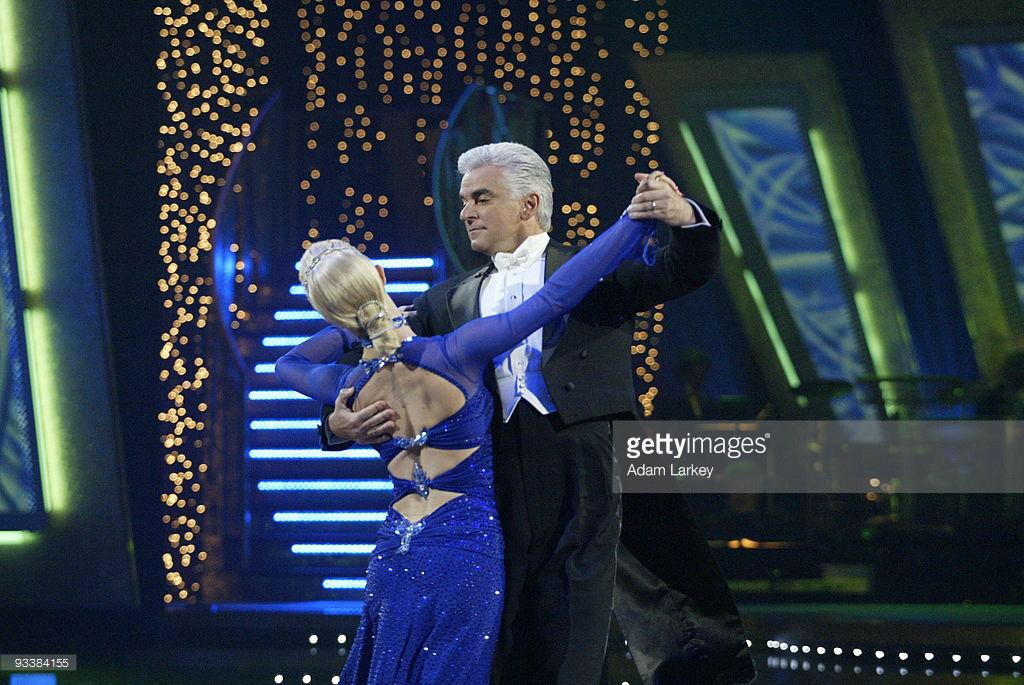
Dominating the competition, except against ABC alumni. (photo courtesy of John O’Hurley)
The ‘Dancing With The Stars’ Debacle
Most Dancing With The Stars fans remember O’Hurley from the finals of the first season, where he lost to General Hospital star Kelly Monaco in a firestorm controversy that resulted in a dance-off. O’Hurley and his partner, Charlotte Jorgensen, won the rematch easily.
O’Hurley was, in fact, the first ever contestant secured for the hit show.
“I’m the guy that would go to a wedding reception with a glass of wine, and as soon as the music and the dancing started I’d go back and raise a glass and say, ‘Knock yourselves out, Shriners!’ But again, I go back to imagination. I said, I’m 50 years old and I don’t know how to ballroom dance. Shame on me. So I said, all right, I’m gonna do it. I said who else have you got? They said, now that we have you, we can get Evander Holyfield.
“All of a sudden it made so much sense to me. That they were just using this series to give America what they’ve been asking for, for more than two decades: the Evander Holyfield vs. John O’Hurley matchup. Finally! On the level playing field of ballroom dancing! It’s clear as day to me.
“I took him out in the third round with my foxtrot. All it took was my foxtrot and he was gone.”
The finals were a bit more of a mess.
“They boxed themselves into a corner with Kelly Monaco. Because she was on an ABC show, and in 2005 all of that stuff was brand new, active stuff, sign on to the network. Well she’s on a show and she’s got 3 million followers on the website. So she won the online vote every week. There were people that would call, but that was only the hour after the show, and then all week long you could vote online as many times as you wanted to, but you had to have an ABC password to vote.
“You see the dilemma. So when we did the finals and she fell three times during her final dance and I had gotten two 10s and a 9, they had to give her three 10s because she had won the online vote from the previous week. My partner was through the roof. She was so angry about that, that it was never about the dancing. We didn’t have to say anything about it, there were 43,000 complaints the day after. They ended up doing a two-hour dance-off, and I ended up winning.
“I got to rule the roost on that, because I said basically, you screwed up your own series, I don’t give a rat’s a**. I said, ‘I want you to give Kelly’s charity and my charity, the winner’s share, $150,000 or something like that.’”
As O’Hurley often says, you have no idea when you do things the good that’s capable of coming from it.
“We finished it, we won, yadda yadda. We all got the $150,000 for the charity. However, that $150,000 was matched up. CBS did a golf competition, because they were trying to cash in on it. They did a matchup between Annika Sorenstam, the #1 female player in the world, and me. It was a “wolf” competition, more of a gambling game…on certain holes you feel you might be able to beat the person, on other holes not.
“I’m playing the #1 woman in the world, for a pot of $350,000. I won. So that was half a million dollars. My charity was Golfers Against Cancer. I had Michael Milken, with the Prostate Cancer Foundation, match it. It came up close to just shy of a million dollars.
“We started nine projects out of that money. Four of them today are still accepted cancer regimens. And that’s unheard of.
“I always look back on the time with Dancing With The Stars, and I see that four cancer regimens started out of that silliness of everything.”

Keeping Up With Baseball Joe
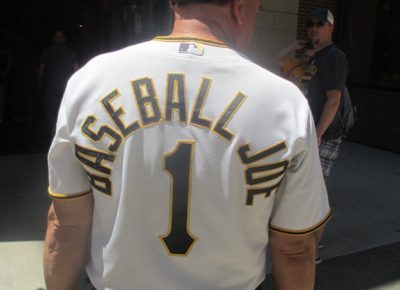
I first met Baseball Joe Vogel on June 12, 2016, while meeting up with friend and fellow baseball road tripper Dan Davies and his group of traveling friends, who invited me to join them in Pittsburgh. He’s become a good friend and I always meet with him when I’m in Pittsburgh.
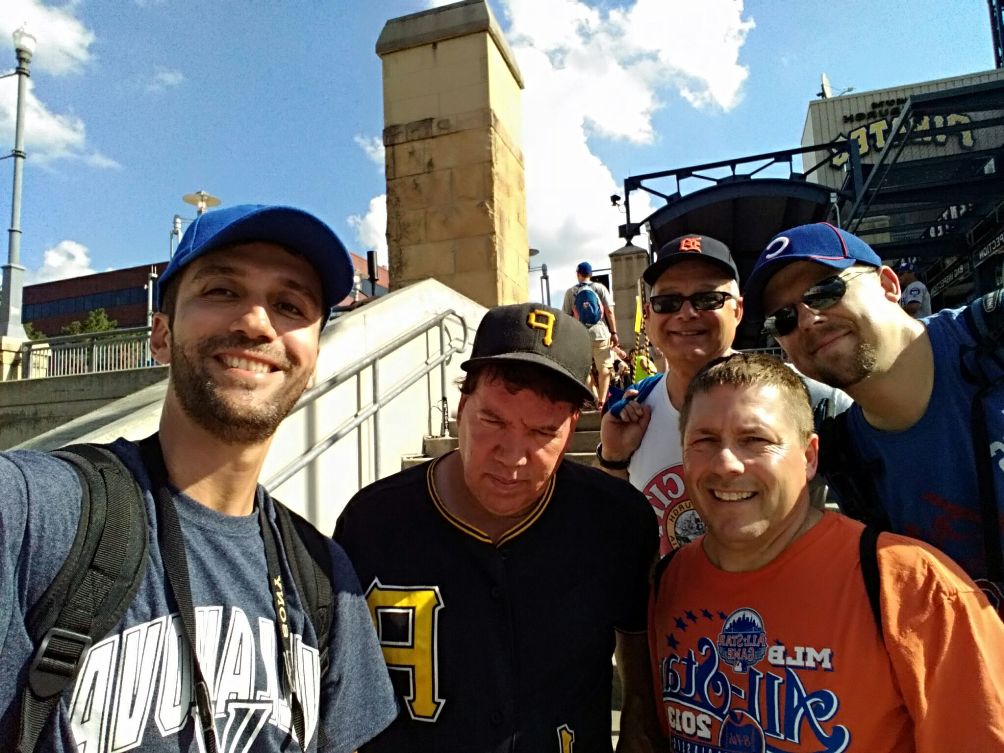
Baseball Joe (center), with Brazilian baseball fan Francisco Dornas (left), Dan Davies (lower right), and the traveling crew.
It was a picture-perfect day at stunning PNC Park, as the Pirates prepared to battle the Cardinals in a late afternoon matchup.
On this day, though, baseball isn’t the only thing on the mind of the Bucs faithful.
Sidney Crosby and the Penguins are in San Jose this evening, set to seal the deal on a fourth Stanley Cup for the city. Which they would, a few hours after the ballgame ends. Penguins jerseys, tees and caps can be seen in large numbers for a baseball crowd.
At one point during the game, a young fan brings out a mock, almost-life-size aluminum foil Stanley Cup and parades it proudly around a section in the right field corner. It gets a round of sustained applause from the excited fans sitting in the area.
But despite being a Pittsburgh native from birth, Joe Vogel is having none of this.
Without warning, as if duty calls him, he springs from his chair in the right field cove and disappears into the concourse. Seconds later he can be seen roaming the section where the Cup-carrying fan was. To the great amusement of his buddies in the cove, Vogel spends several minutes determinedly searching for the fan, who by this point is long gone.
The laughter in Vogel’s section grows louder as his determined search continues well beyond the amount of time one would think the situation warranted. Because after several innings of sitting with this character, they know exactly why he is seeking out the proud hockey fan.
It was to shame him. To frown on him. To educate the young lad on priorities.
Because as Baseball Joe Vogel will always let you know, only baseball matters. Every other sport is a waste of time.

The only fan that can throw a baseball around in a concourse and get away with it.
Baseball Joe is deaf and mute from three debilitating strokes. He communicates through gestures and hand signals, with a small keyboard, or on a folded piece of paper with the alphabet on it.
He lives in an apartment in downtown Pittsburgh, a short walk across the Clemente Bridge from PNC Park. Baseball, Pirates baseball, is his life. It has been since he was a young boy. He proclaims himself the “biggest baseball fan anywhere”, and thus far in my near half century of existence I haven’t met a bigger one…which, if you knew my father, is saying something.
The Pirates know him well. He occasionally plays catch with manager Clint Hurdle and even advises him at times via e-mail. Courtesy of a team that loves his dedication, he has season tickets and attends every game in the covered handicapped section in right field, underneath the right field bleachers. He can’t be in the sun for too long. He may be the only fan in PNC Park who doesn’t care about the picturesque city backdrop.
Sitting with him, it’s almost impossible to pay attention to the game, especially as opposing hitters tee off on Pirates pitching as the Cards would that night. Baseball Joe is every bit as entertaining as the action on the field…constantly having conversations with bystanders in his own way, patiently communicating with his keyboard or well-worn piece of paper when people have difficulty understanding his gestures.
He carries a baseball that he frequently tosses to passing ushers, who nonchalantly toss it back to him, knowing the routine. Throughout the game, other team employees stop to greet him. He constantly collects souvenirs and seems to have a never-ending supply of the large soda cups, one of which he shares with me.
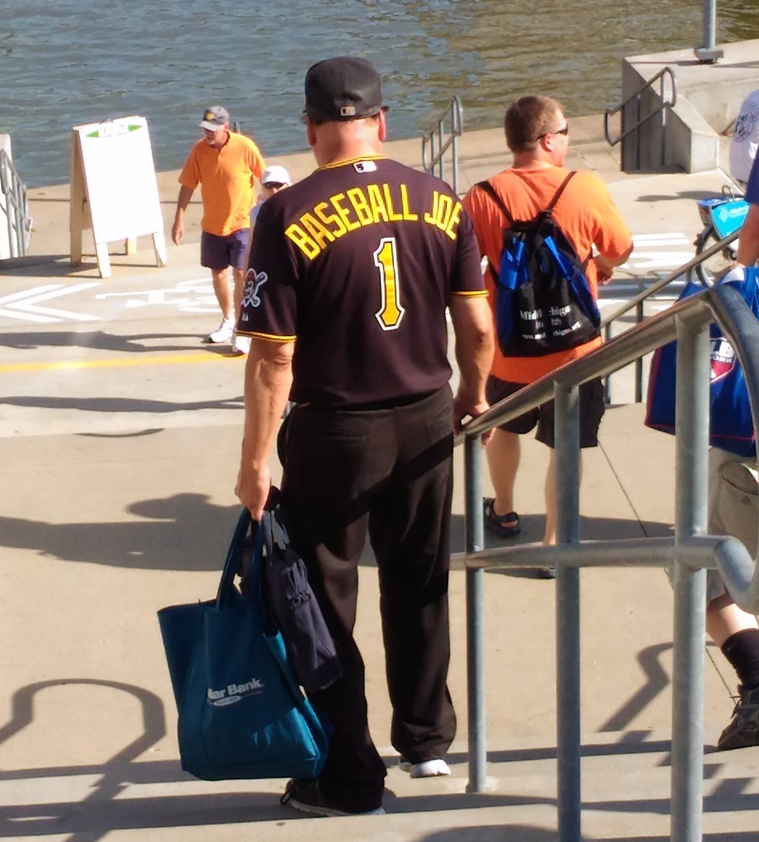
Baseball Joe with his essential ballgame supplies.
Throughout the evening loud laughter is heard in the section at both his knowledge of baseball and his chastising of fellow fans for their comparatively insufficient reverence for the game.
At one point, he asks me if I like any other sports. Forgetting his disdain for the hockey fan, I tell him I like NASCAR too, and he shakes his head. He pretends to be driving a car, and then frowns at me and does the shame symbol with his fingers. He then holds up a baseball and makes a circular motion with his finger. By this point it’s understood. Baseball, year-round.
All night long, it never stops. With his keypad, he fires baseball trivia questions at his buddies…like “Name two players in the Hall of Fame that have the same first and middle names.” A wiseacre in the group replies, with great bombast as if he’s sure of the answer, “Ken Griffey Senior and Ken Griffey Junior!”
As the rest of the group laughs, Joe smiles, turns to me and informs me: Henry Louis Aaron and Henry Louis Gehrig, or Joseph Paul DiMaggio and Joseph Paul Torre.
Later Dan, who took Joe along with his group to several ballparks and the Hall of Fame, told me the story of his wiping up the floor with an interactive trivia game at the Hall. If there was a baseball edition of “Jeopardy”, Baseball Joe would be Ken Jennings.

Home of Baseball Joe.
Baseball Joe holds the distinction of being the first fan to ask for my autograph, at least as an author of baseball books.
At the Pirates game, he asked me to send him the PNC Park E-Guide…and to autograph it for him. He also gave me firm instructions…make sure I sign my full name, middle name included, and do it neatly, which I am not accustomed to doing with my usual chicken scratch of a signature. He’s a stickler, this one, especially when it comes to matters baseball.
Joe loved the E-Guide and raved about it to me in an e-mail…a badge of honor…but he also had a few suggestions: elaborate more on seating, include some photos in the whitespace, and maybe talk more about food and such. He is the first fan ever to complain to me that there isn’t enough information in a Ballpark E-Guide.
He has been repeatedly asking me to send him guides for Wrigley and for Busch in St. Louis, should I ever write that one. I will. I’m always happy to have an audience.

Citizens Bank Park from the west.
A few days after the Pittsburgh experience, I met up with Baseball Joe and the group again, this time in Citizens Bank Park in my hometown of Philly. I found them a free parking spot and sat with them in the upper level for the evening. Throughout the evening, Joe kept me entertained, once again more often than the action on the field.
I tell him I am an Orioles fan, and he holds up fingers…first seven and then one. I immediately get it. 1971 World Series. Pirates over the Birds in seven. I was three.
Then he makes a “7” and a “9” with his fingers. 1979. The Pirates, led by Pops Stargell and rallying around the passing of manager Chuck Tanner’s mother, come back from 3-1 to once again beat the O’s in seven games. My response is to hang my head and to pretend to rub tears from my eyes, illustrating the heartbreak of the 11-year-old Orioles fan that year. “I still NEVER dance to ‘We Are Family’”, I inform him.
He nods, understanding. He does the eye rub himself when he brings up the Pirates’ long stretch of down years.
He asks me who my favorite player is, and when I say Cal Ripken Jr., he quickly replies on his keyboard with a stat for me: “Lowest batting average of any player with 3,000 hits”. Sigh.
When I show Joe a picture of my daughter posing with baseball-themed stuffed animals that I’ve brought home for her from my travels, he briefly types on his keyboard and shows me. “You so blessed,” it reads. “Me haves no family.”
I instantly feel both sad for him and guilty about the occasional dissatisfaction I feel with my own life. He’s right. I am so blessed. I not only have two beautiful and healthy kids, I still have time for the only sport that matters.
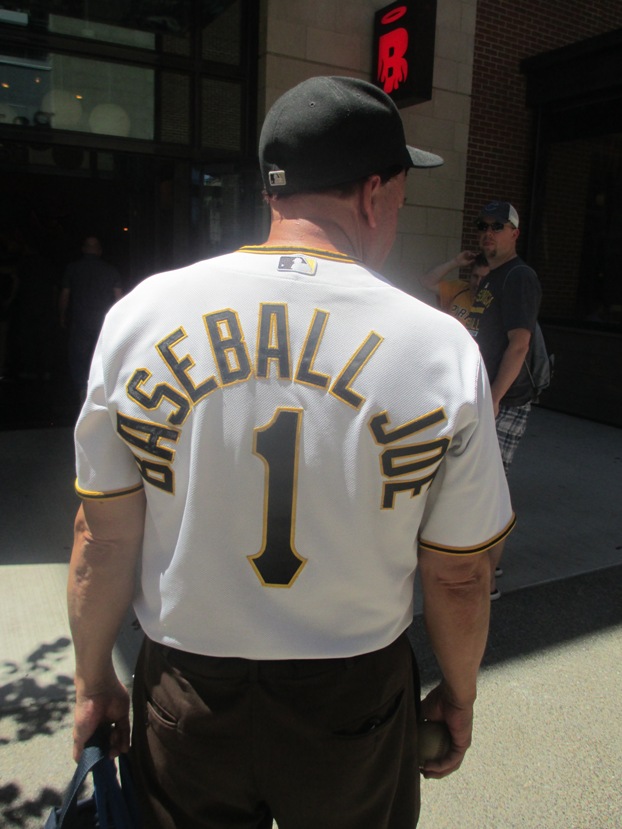
Baseball’s #1 fan.
Long after the crowd has filed out of Citizens Bank Park that night, Baseball Joe manages to make a few ushers uncomfortable with his refusal to leave the seating bowl before collecting as many souvenir cups as he can. You can see clear agitation growing in the ushers’ eyes as they anticipate a confrontation. Joe seems oblivious to the approaching ballpark police, but he exits the seating bowl at what seems the exact moment before the ushers turn snooty. He’s a pro at this.
Back at the hotel where the traveling fans are staying, Baseball Joe and I pose for a picture, and he surprises me with a huge bear hug. Apparently I’ve made a good impression. I’m grateful that he’s not upset with me for showing him family photos.
Joe and I e-mail each other frequently. In his e-mails to me the subject line is almost always “Baseball 24 7 366”—making sure he’s covered in leap years. His e-mails are usually brief but always thoughtful…wishing my family a great holiday season, asking me to send along more E-Guides when I can, and sharing his thoughts on the Pirates’ fortunes. Shortly after the Pirates failed to make the playoffs in 2016, he sent me an e-mail with the words “Pirates eliminated – me cry” in it. For 33 years and counting, this Orioles fan has known the feeling.
I’m always grateful to hear from him. Because whenever I reflect on it, he’s right. Other sports are a waste of time.
And Baseball Joe knows as well as anyone that our time is too valuable to waste.
Did this post make your day a little bit?
I hope so. If it did, I would really appreciate your support.
When you use this link to shop on Amazon, you’ll help subsidize this great website…at no extra charge to you.
Thanks very much…come back soon!
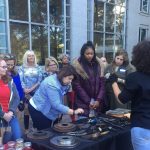
Because She Can – Patrice Banks
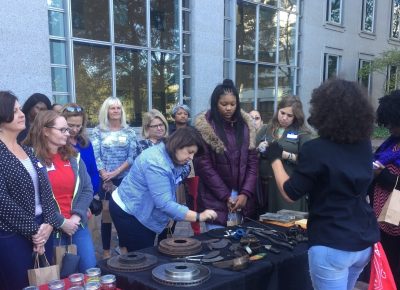
Patrice Banks gave up her six-figure income occupation to start up the Girls Auto Clinic, an auto repair shop run by and for women. Women can get the car fixed and have their nails done while they wait.
This piece appeared in the December 2017 issue of JerseyMan magazine. You can read it on their website here, or click here to see the PDF from that issue.
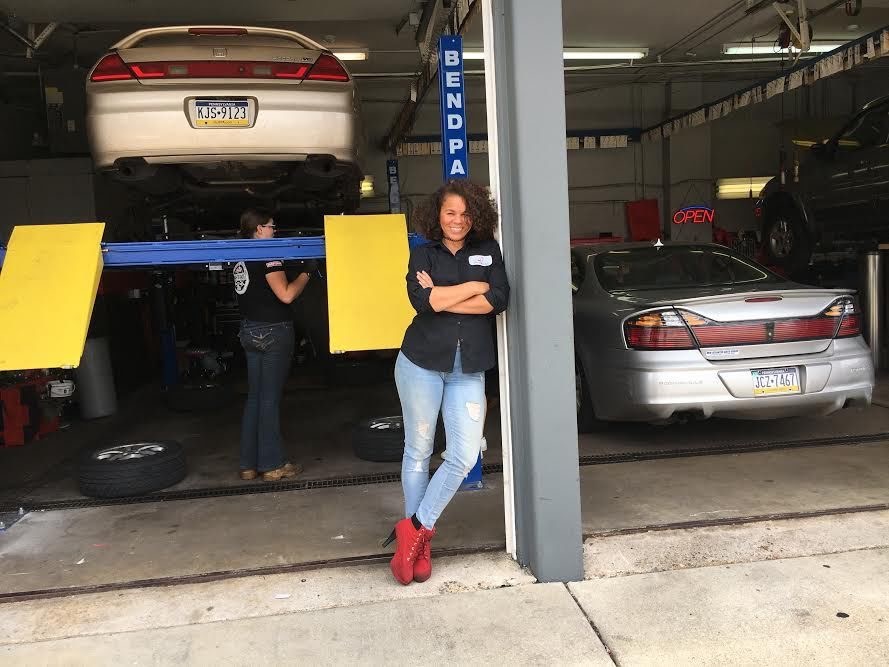
The attractive and savvy Patrice Banks at her auto repair shop.
(Photo courtesy of Patrice Banks)
Because She Can
Patrice Banks, owner of Girls Auto Clinic in Upper Darby, is smashing a conventional wisdom held for generations…that women can’t understand cars.
As we guys know, our women can be astoundingly forgiving sorts. We see it an awful lot with our leaders’ wives. We screw up regularly, and they not only put up with it, they’ll even show support for us in public.
But take advantage of a Philly girl one too many times, and one day she’ll open up an industrial-sized can of whoop-ass on you.
For example, imagine an entire industry neglecting a demographic worth $200 billion a year. That’s how much the fairer sex spends buying automobiles and repairing them. And yet in a 2013 RepairPal survey, two-thirds of them believed they were overcharged for repairs simply because they are women.
Patrice Banks, owner of the Girls Auto Clinic and Clutch Beauty Salon in Upper Darby, knows the feeling. As a former “auto airhead”, she spent much of her adult life dreading—and sometimes dangerously postponing—trips to mechanics for oil changes and repairs. Like much of her gender since the dawn of automobiles, her lack of car knowledge caused her to zone out whenever a mechanic explained a repair. And yes, she has stories about being ripped off.
One day a wormhole opened. Banks suddenly decided to answer a simple question that no one had answered in over a century: Why are females so intimidated by the workings of an automobile?
Answering the question turned into a lifetime mission…to finally answer to the needs of that $200 billion demographic.
At Girls Auto Clinic, women can get their car serviced…and have their nails done as they wait. Nearly all her employees, including the mechanics, are women. The store is popular enough to have a 4.9 rating in 188 Facebook reviews. Banks also hosts popular and free workshops, and maintains a blog on auto repair and maintenance.
She also managed to publish a 300-page book breaking down and explaining cars, titled the Girls Auto Clinic Glove Box Guide. The book openly states that it’s a necessary component of a well-stocked glove compartment. Boastful? Maybe. But in the book, the blog and her workshops, with her simple explanations of why cars need oil changes and what crankshafts do, Banks makes the point throughout: this stuff isn’t that hard. If a former auto airhead can teach it, anyone can learn it.
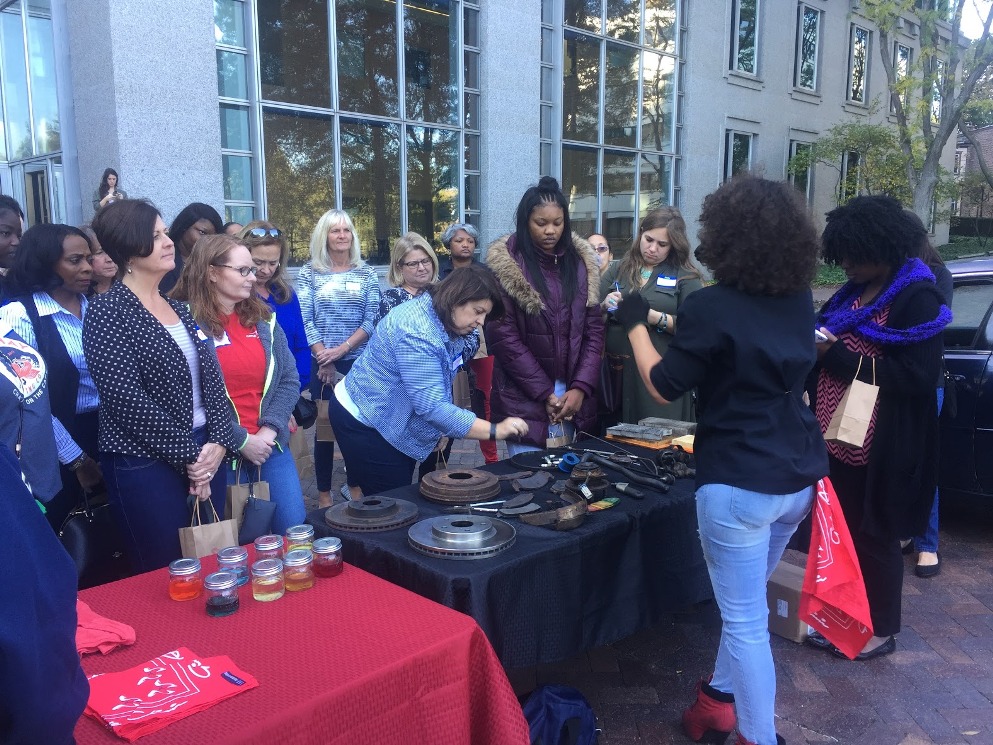
The former auto airhead is now a teacher.
(photo courtesy of Patrice Banks)
If she only desired financial success, giving up a lucrative career and sinking one’s life savings into an untested business model would be an odd route. It’s female independence that drives Patrice Banks.
As the daughter of a single mother—who, as Banks puts mildly, made poor life choices—she saw first hand the need for women to be self-sufficient.
“I didn’t have an empowered mother, which is crazy, because I was always an empowered girl. I always wanted to prove that women could do anything men could do,” she says. “I believed I was bigger than my surroundings. I didn’t want to become my mother. So I was always funneling my extra time into positive things, schoolwork, sports, having jobs.
“My mom didn’t know how to drive, she took the bus to work. I had to ask people for rides home, and I hated being dependent on others. And that has a lot to do with why I’m very self-reliant.”
In her desire for a better life, she toiled for a degree in Materials Engineering from Lehigh University. From there she spent 12 years as a failure analyst and manager at DuPont, where she was pulling down six figures. In other words, she made enough money to buy new cars solely to minimize trips to a mechanic.
In her spare time, she started a blog called “Banks On It”, dedicated to teaching women to do things they generally paid or asked men to do…such as fixing toilets or investing money. As she mined for ideas, she asked every woman she knew what they needed help with the most.
The overwhelming response? Wait for it…“Cars.”
Banks searched for a female mechanic in the area to help her explain automobiles…and came up empty. It was, she says, her “light bulb moment”. The well-paid engineer decided to become a mechanic herself.
She spent evenings earning an Automotive Technology diploma from Delaware Technical Community College. During that time, she offered to work as a mechanic for free…and was turned down at several shops, for reasons like “the boss’s wife won’t like it.” Once she became familiar with the not-so-complicated inner workings of automobiles, she opened her own shop.
Judging from the exposure she’s gotten since, including appearances on Fox & Friends, CBS This Morning, and O Magazine, it sounds like she’s onto something.
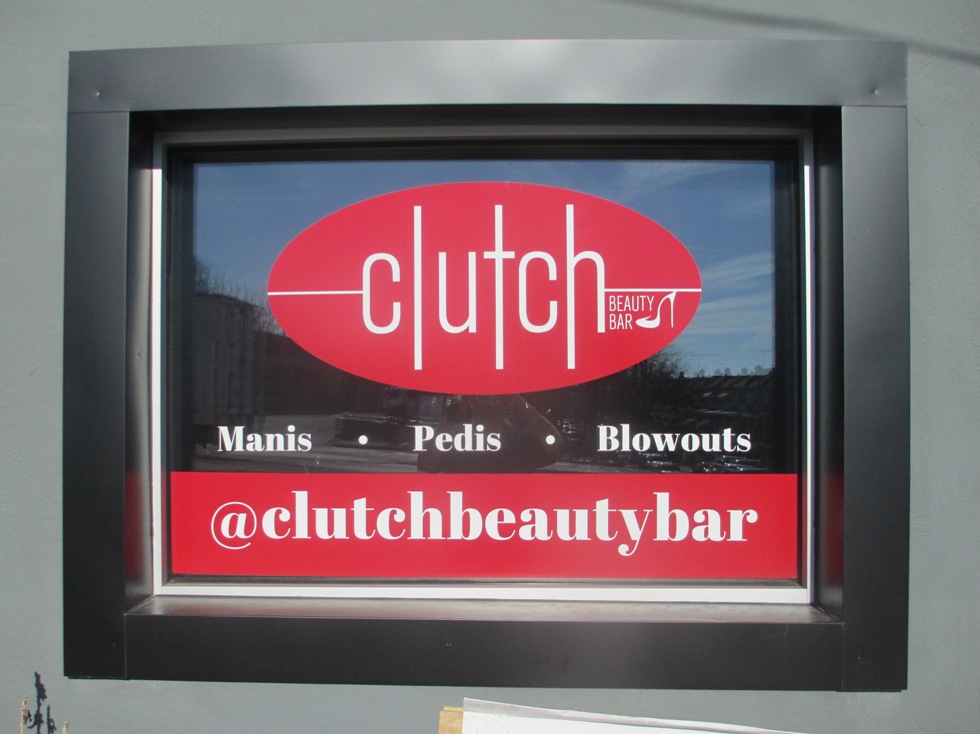
The salon right next door, for hair and nails while you wait.
As Banks wrote in a Washington Post op-ed, 2% of the nation’s auto mechanics are women, and just 13% of car salespeople are women. She drove home the point: “it’s easy for us to feel misunderstood and mistreated by the auto business when we don’t see ourselves reflected in it.”
“We need to have more women in the industry that we can interface with, that we can talk to about our cars,” she says. “Women would rather deal with a woman because we know what they go through. We have women that come from miles away, they don’t even care about our certifications, they trust us to work on their cars because we’re women. That’s how bad it is.”
As an example, she cites unnecessary “upsells” like filters and flushes that shops peddle to less car-savvy customers. “They do need to be done, but they only need to be done at certain times. You don’t need an air filter every oil change, you need one maybe every other oil change.”
She unequivocally states that it’s ingrained. “It’s become this culture, because of the way that the business model is set up. I see people being told they need new brakes when they don’t. I see that all the time. When I went back to school, I realized what’s really necessary. We’re not going to upsell, we’re going to offer you a fair price.”
And if you’re marketing to women, it doesn’t hurt to have a beauty salon as a waiting area. The Clutch Beauty Bar is humorously auto-themed, with toolboxes at each station and a sink constructed from a wheel. It’s a place where women can get “manis, pedis, and blowouts” as their oil is being changed.
The customers love it. As Lorie “Lulu” Tisdell gets her toenails painted, she gushes excitedly about GAC, pointing out the toolboxes and hanging extension cords in the salon and sharing her story about finding the place during a snowstorm. Lulu has been a loyal devotee since the beginning.
Even more so, Banks’s employees are appreciative. As Colleen McClure works the front desk taking calls and speaking with customers, she shares how she worked for years at a hydraulic shop and turned wrenches at other independent repair shops. She offers a simple explanation why she quit: “I was treated like s***.”
It’s an obvious business model. But an industry that spends millions coming up with car names like “Probe” and “Cruze” somehow missed it.
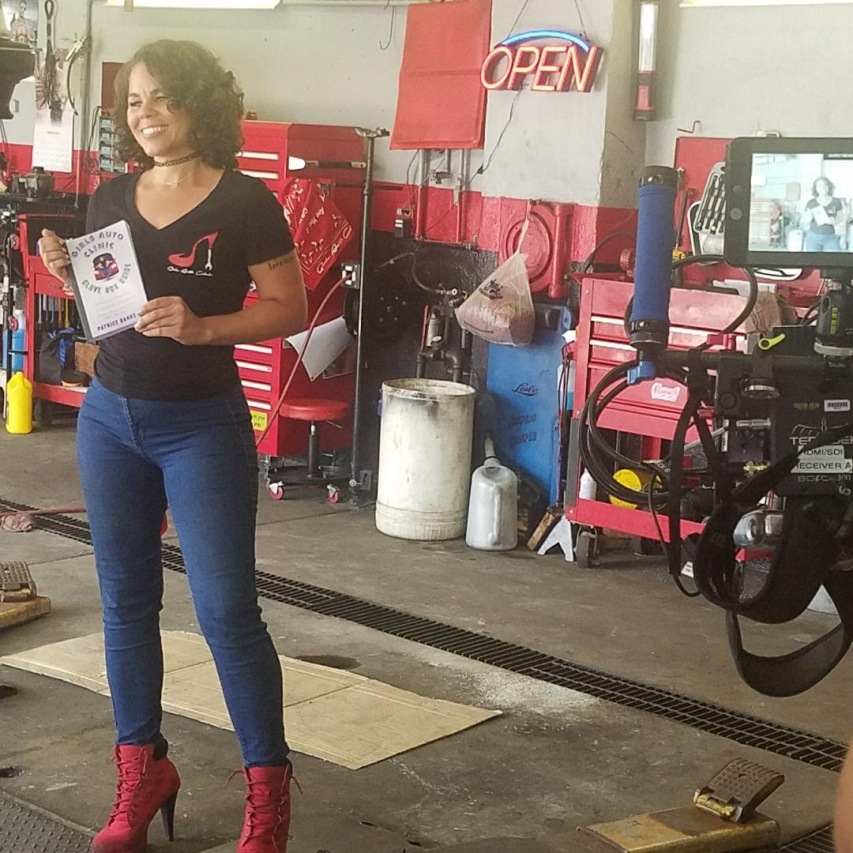
Patrice with her book, an easy, enjoyable read.
(photo courtesy of Patrice Banks)
It’s actually difficult to imagine Patrice Banks having difficulty persuading a man to fix her car. She is easily personable, bubbly but never overbearingly so, and decidedly easy on the eyes.
Away from a camera or microphone, her humility stands out far more than her trademark spunk. She can even be seen decorating a Christmas tree in the shop. “I always look forward to decorating until I’m actually doing it, then I realize this is hard work,” she jokes. When talking with Patrice, one never gets the impression that she considers herself superior.
Which, when you think about it, makes her a perfect fit to appeal to a demographic whose pet peeve is feeling condescended to by mechanics and salesmen.
Ask her what her proudest achievement is and it’s not being featured in Oprah’s magazine or on national TV. It’s her success in what she set out to do…help women in an arena where they have been neglected, and given the amount of money they spend, profoundly underappreciated. There have been difficulties, to be sure, but Patrice Banks has no doubt that this is what she was born to do.
“With any startups, you make a lot of mistakes that cost you a lot of money. Everyone will. I tell people, I fail every day, and I look forward to it, because it gets me closer to winning. Small businesses make dumb mistakes, big businesses make dumb mistakes and it costs them millions. I’d rather make them now when I’m small.”
There is nothing small about the impact Patrice has had on her employees especially. “Since my shop opened, my mechanics have come to me and said this was the best paying job they’ve ever had. And that makes me feel good, to be paying women well, to help their families, particularly in a profession that they’ve struggled in and been kicked out of.
“That to me is my greatest accomplishment, and I’m grateful.”
Did this post make your day a little bit?
I hope so. If it did, I would really appreciate your support.
When you use this link to shop on Amazon, you’ll help subsidize this great website…at no extra charge to you.
Thanks very much…come back soon!
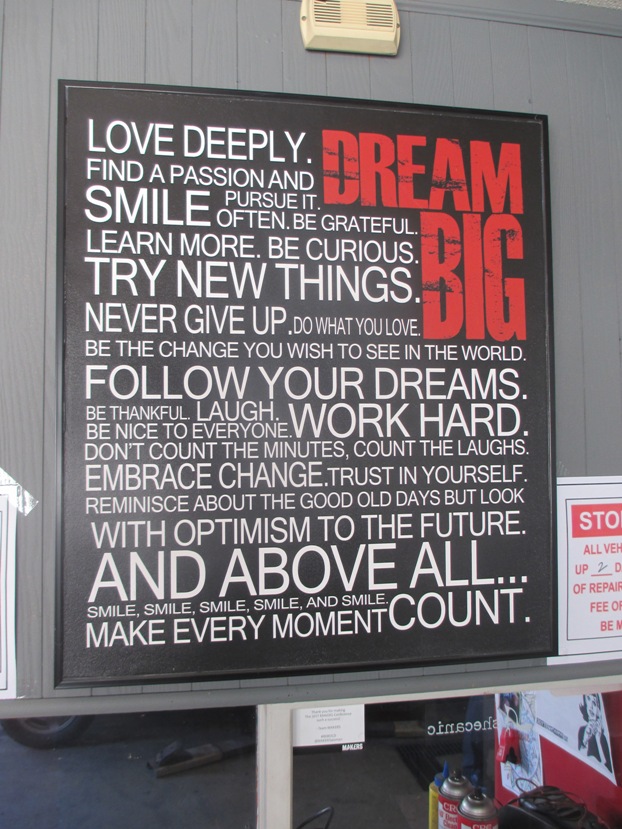
It’s actually all common sense when you think about it.
You Turned Down Who?
Despite that every day she has to ensure that customers keep coming to the shop, Patrice Banks has turned down opportunities for publicity that struggling entrepreneurs would die for. Imagine rejecting offers to appear with Rachael Ray or Ryan Seacrest, or even a chance to show America your business on “Shark Tank”. But she’s learned that national exposure isn’t always a good thing.
“Press isn’t always cracked up to what you think it is,” she explains. “And one of the reasons is that there’s too much content. Everyone’s looking for content. I would be excited at this network coverage, and they would do the story and I would be on TV, but all I have is my shop, I can’t reach someone in California. So it wasn’t translating into sales.
“We were having people come here and shoot all day, five or six hours, but some people would like my page and that was it. I couldn’t convert it into buyers. It started to become a distraction, because I had nothing to sell to a national audience. People would want me to franchise, and I just can’t yet. It wasn’t an advantage, because I wasn’t prepared for it.
“Rachael Ray and Ryan Seacrest, they all wanted to have me on before my book came out. The problem I have now is, now that I have a book to sell, the old press are saying, well, we’ve already done a story on you. And new press is saying, well they did a story on you.
“But you don’t know these things starting out. You’re all like, it’s great, and you can talk about it, but you realize that’s not always the best way to go about it.”
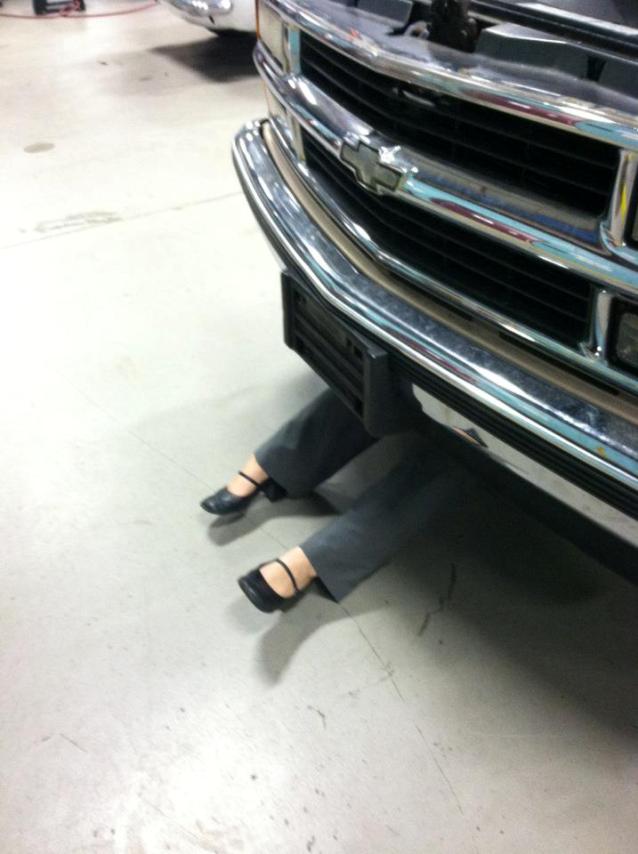
The trademark heels.
What is a #SheCANic?
Part of Patrice Banks’ dedication to helping females is by turning them into “#sheCANics”. The term, in her words, describes “a female of any age who has mastered the mechanics of ‘yes I can’ and uses them to get to ‘yes I did.’
On the #sheCANic page of the Girls Auto Clinic website, women can read a blog full of car tips, find out when and where Patrice will be giving her next workshop, or join a Facebook community of over 9,000 members where they can have their car questions answered.
The blog is full of posts directed at women…with titles like “Alternators Are Like Cell Phone Chargers…” or “Does Your Car Have Boogies?” But they are ultimately serious and simply explained posts designed both to help women take better care of their cars and also to realize that these things are easy to understand.
The #sheCANic logo includes the red heel, a part of Banks’ signature look that happened by accident. “I had to go right from work to school,” she told Oxygen.com. “At work I wore slacks and heels. At school we had to wear dirty clothes, so I mixed them up. One day I was under a car pulling out a starter, and someone took a picture of my heels sticking out. It was perfect.”
Incidentally, no, Patrice doesn’t work on cars with her heels on. Nor, she says in her book, does she recommend doing so.

Respect, Integrity, Trust – JDog Junk Removal
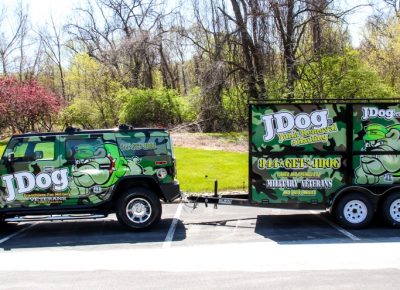
JDog Junk Removal recently opened their 200th franchise in the Boston area; BostonMan magazine asked me to cover the milestone. (You can view the magazine article here.) I spoke with owner Jerry “JDog” Flanagan and his partners about the company and their brilliant business model. (See JDog’s website here.)
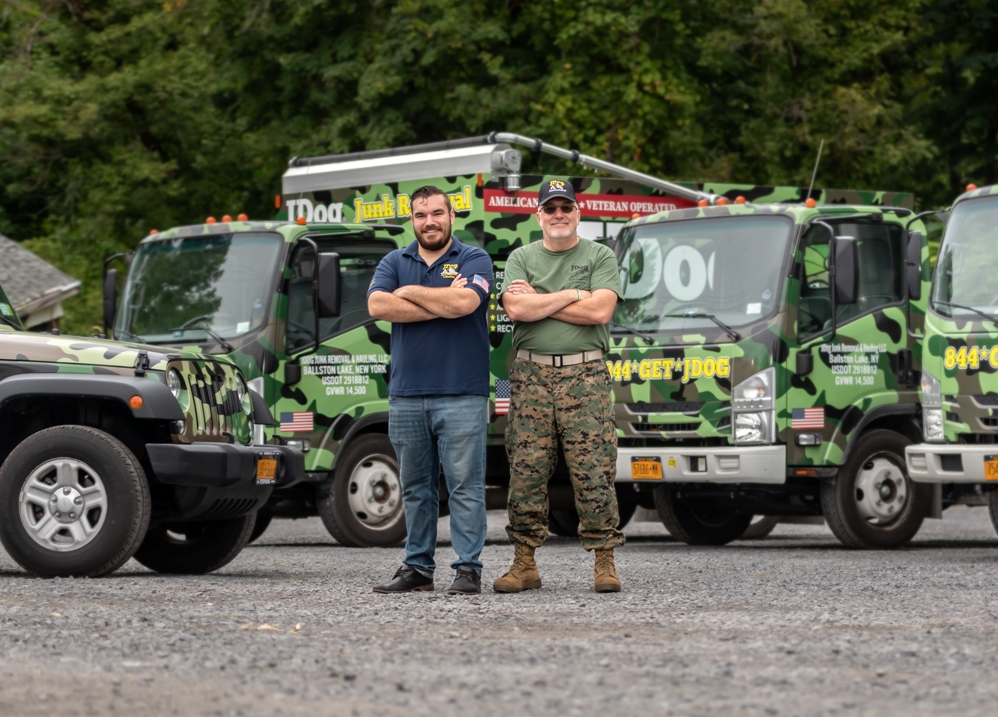
Respect. Integrity. Trust.
JDog Junk Removal is opening their 200th franchise here in Boston…and they’re bringing their military-inspired values of respect, integrity and trust with them. Those values have inspired a pretty stellar business model.
The idea of hiring veterans doesn’t need to be sold to business owners as a gesture of gratitude for their sacrifices. But there’s another very good reason. It’s great for business.
If you have any curiosity why, listen to R.J. Gagnon, co-owner of JDog Junk Removal’s new Boston franchise, tell you about Crazy Keith.
“When we interviewed him,” Gagnon says, “he needed help. We had a couple of concerns. Obviously he was a little older than most of our guys, doing this very physical job. And he was a Vietnam vet that came with his own set of troubles and conflicts.
“So the first thing we did was make sure that we found him a place to live in the area. We found him an apartment, and we helped him get established and get into programs to help him.”
R.J. and JDog needn’t have worried.
“This Vietnam War veteran, he rides his bike from his apartment to the bus stop, gets on the bus, rides into the city the hub is in, has a bike stationed at that bus stop, jumps on that and rides into work, repeats the process home, and repeats the process day after day.
“He is never late, he never calls in sick, and he works harder and faster than any 20-year-old on our crew. He has a nickname, Crazy Keith, because when they get done with a whole house cleanout, panting in the hot sun, Keith is still doing somersaults and flips and starting to stretch out with his martial arts moves. Those military values of completing your mission? That’s what he lives and breathes.”
Incidentally, that rubs off on team members.
“He is like a role model to some of the younger civilian guys. ‘How is this 62-year-old Vietnam vet out-hustling me? I’m 20 years old and he is out-maneuvering me out there!’”
R.J. Gagnon’s father, Ray, is a retired Marine Corps Master Gunnery Sergeant. The two are taking command of JDog’s 200th franchise, located in the Framingham/Worcester area. The growth of JDog, which originated in Philadelphia, has been swift and decisive…in no small part because of their hiring and franchising practices.
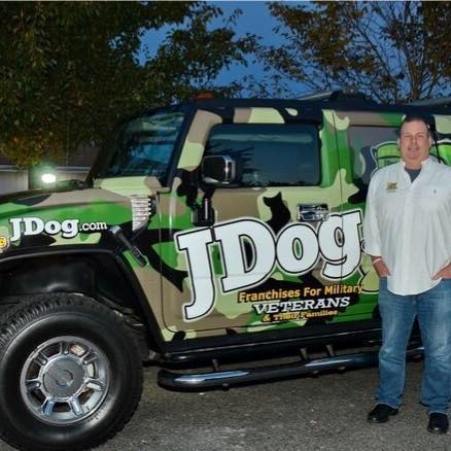
Jerry “JDog” Flanagan, making a difference for those who’ve made a difference for us.
Jerry “JDog” Flanagan, co-founder and CEO of JDog, was a wire dog in the Army, hence the nickname. He has never needed to be told the value of employing someone who has served in the toughest of environments. He knows the work ethic ingrained in a military uniform.
“You’re 100% accountable for your actions,” he says. “You learn how to respect people, you learn how to say yes sir, yes ma’am. And your work schedule is out of control. You’re going to work more hours than you’ll ever work in a civilian job.”
It was great life training for the workplace. “I was able to get to work before everybody else, I stayed later than everybody else, I volunteered for all the crappy shifts. It separated me from the average civilian.”
Flanagan learned, as most entrepreneurs do, that his work habits would better benefit his family if he owned the business himself.
With his wife Tracy, he started a kids party center in 2007. It went under in the recession of 2008. Without a college degree, he needed a better way to support his wife and daughters, so he researched recession-proof businesses. One of them was junk removal.
He started handing out postcards offering junk removal service to neighbors. The ones that hired him were immediately impressed.
“I had been doing it for about two weeks, when someone mentioned that I was doing the job so fast and on time, and I was in a polo shirt and was clean cut. They wanted to know where this came from. I said, well, I was in the military, so I’ve always been able to outperform anybody because of my work ethic.
“They said, ‘You should market that!’ So I slapped ‘Army Veteran’ on my business cards and stuck it on the side of my jeep.”
The response immediately showed that he was onto something. “The phone started blowing up and everyone started using me in the area. I lasted probably eight months, and I realized that I needed helpers.
“I went to the VA, and I hired compensated work therapy patients that were struggling with drugs and alcohol. Combat veterans that were coming back and couldn’t find work. I was rotating different guys into my trucks, putting them on the other side of couches and carrying items.
“They felt great about it, and we were able to run the business with almost all veterans initially. I realized that we had something big here, and my wife said we should franchise this thing. We sold five franchises, and I realized other veterans wanted to be part of this.”
As Flanagan says, it’s a hand up, not a handout.
“It’s not just about philanthropy. These are real businesses. They make real money, real equity for families. When you have that and you have fun doing it, and you’re putting veterans to work, and the community’s getting behind you…it’s just a recipe for massive success.”
His customers “just have a lot of respect for military, either side of the aisle, it doesn’t make a difference. I had no idea that it was going to be that powerful. I didn’t realize that the competitive advantage of being a military veteran business was that strong.”
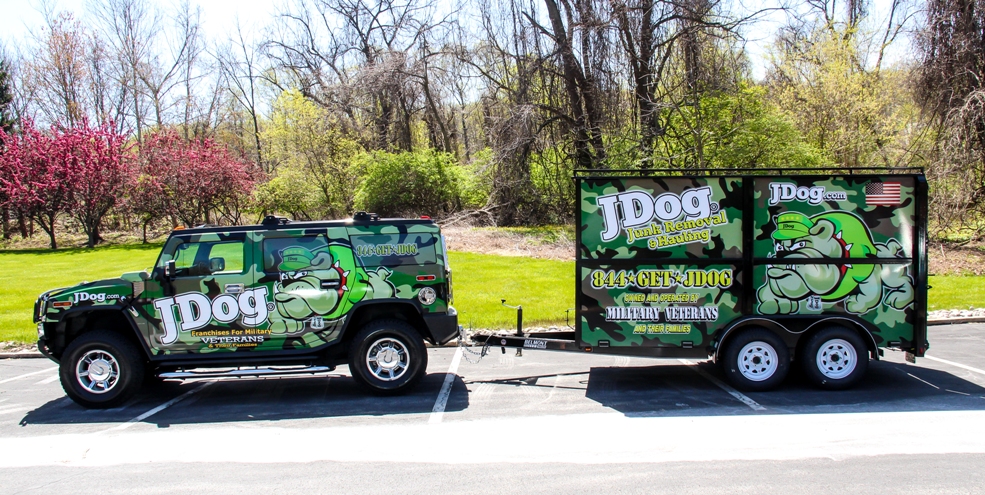
Camouflage makes for some stunning logo artwork.
So why don’t more veteran-owned businesses trumpet military service, such as with the stunning camouflage-painted trucks like JDog uses? Gagnon thinks it’s a reluctance to use their service for personal gain. A reluctance that both he and Flanagan believe is misguided.
“I see it as a way to communicate that we’re respectful, that you can trust us, and that we carry ourselves with integrity,” Gagnon says. “Veterans became different people the moment they signed up. They’ve served everyone, and that brings with it some weight and value.”
Flanagan agrees that it’s an unquestionably impressive credential.
“The way I equate it is this: if you went to get your MBA at Harvard or you graduated MIT, what are you going to do? You’re going to put that on your LinkedIn, you’re going to put it on your resume, you’re going to let the world know, right? Well, veterans don’t do that, and veterans need to, because you could equate it as something similar of an accomplishment.
“There’s veterans out there that own a business, you’d never even know they’re a veteran. They’ve gotta figure out how to get their brand out there, because it really works.
“Customers are longing for someone to open the door up in their home, and say thank you, good morning sir, look them in the eye, do a really good job and have respect, have integrity and have trust. And the company was founded on respect, integrity, trust.
“They’re going to use us over and over again. They’re going to tell their friends and family. They tip us, they make sandwiches, they leave their doors unlocked for us to go in when they’re not home. It’s insane. There’s not one other service model out there, plumbers, painters, you always feel like you’re getting ripped off. In our case, it’s the opposite.”
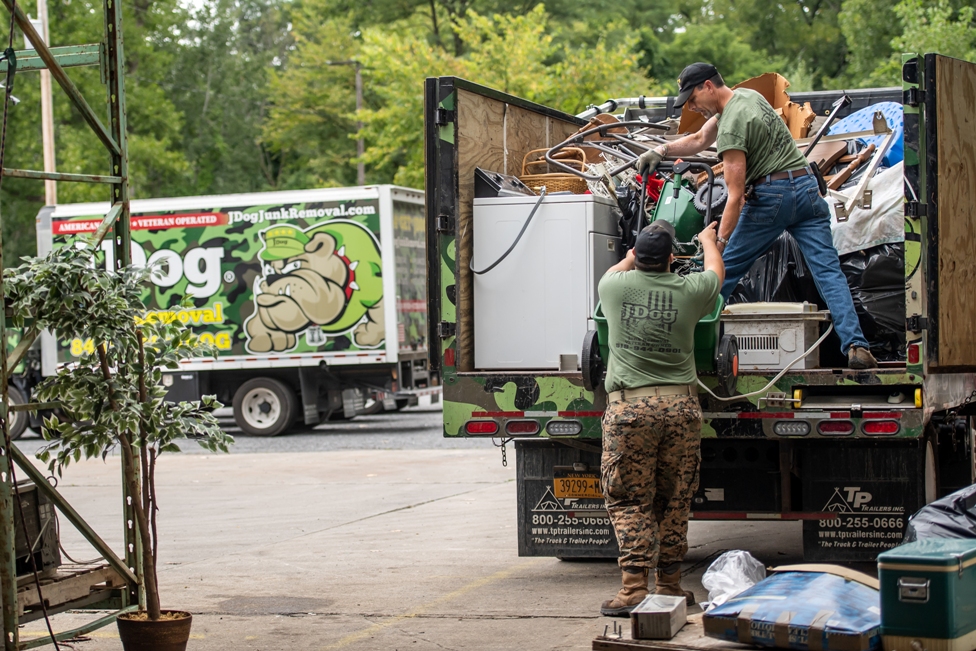
JDog has an effective recycling program as part of its business model.
JDog is not only a phenomenal success story for veteran employees and franchisees, they’re a tremendous boon to communities they serve, both by helping local veterans and protecting the environment.
Between 70% and 80% of what JDog collects, according to Gagnon, never reaches a landfill. They use a process R.J. calls the three Rs: re-purpose, re-sell, or recycle. Still-usable items, such as furniture, get donated to charities helping veterans in the area. For items that are re-sold, proceeds go to funding charitable functions. Other items get recycled, including paper, cardboard, glass, plastic, wood, and metal.
Everyone benefits. “Those programs are part of the reason why they decided to go with JDog. People know that it’s not just a junk removal company. We’re actually doing something good here.”
Their 200th franchise in the Cradle of Liberty, while obviously momentous, is just another stop on the freeway. JDog has signed on for 300 more franchises, including a few more in the Boston area.
In the space of just a few years, Jerry Flanagan and his warriors have built an extremely lucrative business with one simple premise…that military values of respect, integrity and trust bring an almost unbeatable competitive advantage to an enterprise. More importantly, Flanagan, his wife Tracy, and his business family like the Gagnons, have found a calling.
“The model that started out as a way of survival has turned in to a massive inspirational company that’s changing families and lives,” Flanagan reflects.
“We’re bringing veterans back together under one ethos of brotherhood. And that gets me up very early every day. It just doesn’t stop, because if there’s a veteran out there in the United States, my obligation is to put them in business wherever they are in the country.”
Judging from JDog’s astounding growth, it looks like Americans are on board with the plan.
Did this post make your day a little bit?
I hope so. If it did, I would really appreciate your support.
When you use this link to shop on Amazon, you’ll help subsidize this great website…at no extra charge to you.
Thanks very much…come back soon!
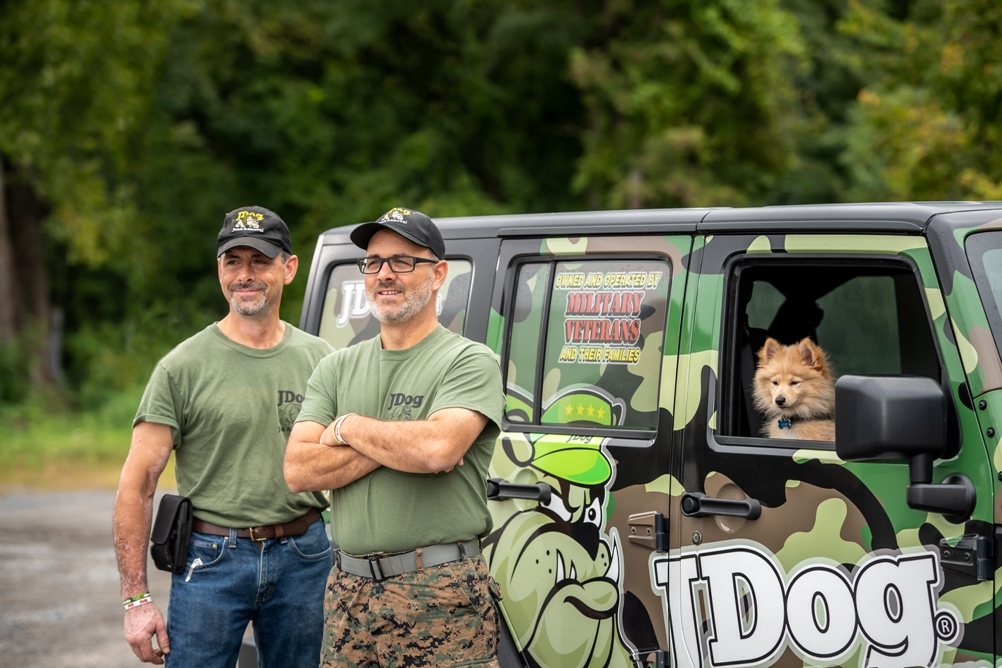
A great deal for military members and potential business owners.
Own A JDog Franchise
JDog is offering franchises by the truckload, but their focus is franchising to military veterans and their family members. Having a DD-214 or being an immediate family member who can show a DD-214 is a must. They also take a good look at a prospect’s finances, conduct multiple interviews and introduce them to their staff.
But if you’re a veteran looking to run your own show, it’s a great deal.
“Basically we wind them up and let them do their thing in their markets,” Flanagan says. “We’re not killing everybody over small stuff, as long as they’re running their operation properly.”
Gagnon, whose strength is marketing, understands the benefit of such creative control. “We’re empowered to make the business decisions that we have to make that make sense for our business and our territories, which you don’t get with a lot of other franchises.”
Flanagan also believes in rewarding the ones that do well over time. “We have a flat, scalable royalty. What that means is they pay a flat royalty a month regardless of what their sales are. So if they’re doing higher in sales, they keep those proceeds, they keep the recycling dollars, they keep the re-purposing and reselling dollars, which allows them to expand and reinvest back in their own territories.
“A lot of these guys are getting fees for their call centers, their routing systems, their website, their PR. We don’t charge for any of that stuff. That’s all part of the franchise, which makes it very, very affordable.”
If you’d like to find out more, there’s a separate page on the JDog website dedicated to franchising, including a video of the benefits. It’s at https://www.jdogfranchises.com/.
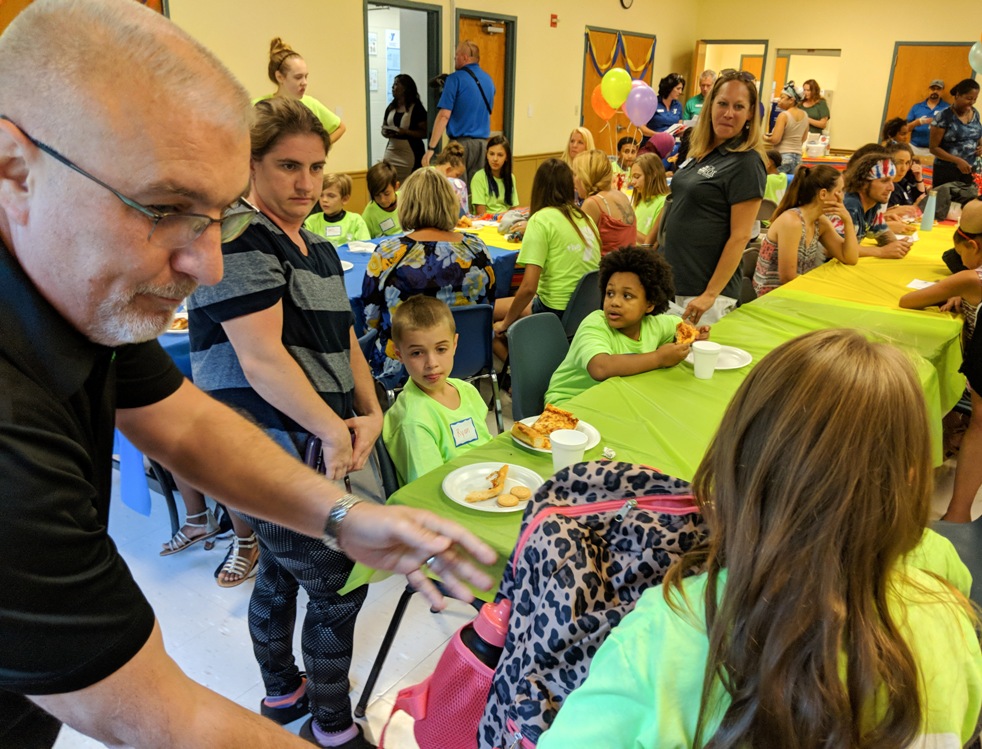
Offering a hand to the heroes of the future.
Giving Back: The JDog Foundation and Military Spouses
JDog is philanthropic by nature, donating furniture and usable goods to veterans in need and using proceeds from recycling for charitable events. But now they’re giving back to America’s finest too, with the recently formed JDog Foundation.
The JDog Foundation’s mission is to “provide leadership, support, awareness, and funding to Veteran Organizations that are charged with rebuilding or repairing homes and lives for our Veterans.”
They’ve landed a good representative to head the foundation…Ralph Galati, a former POW who was captured when his plane was shot down and landed in the Hanoi Hilton with John McCain. He was released in March of 1973, just after his 25th birthday. Galati is the former Director of Veterans Services at St. Joseph’s University in Philadelphia.
JDog franchise owners also benefit from Tracy Flanagan’s Military Spouses program, the group of women supporting their business owner husbands. Tracy writes a newsletter and manages the group, Jerry says. “It’s just supporting their franchisees out there through the women, who really run the operations and the houses behind the scenes, really.
“We all have to answer to somebody and it’s those women out there that are really strong.”
If you’d like to find out how to contribute to the JDog Foundation, it’s at https://www.jdogfoundation.org/.
(all photos courtesy of Jerry Flanagan and JDog Junk Removal.)
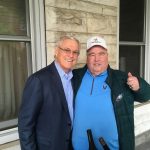
Philly Forever – Former Eagles GM Jim Murray
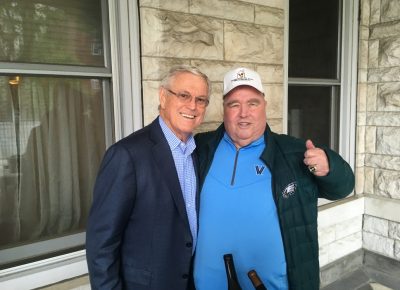
JerseyMan sent me to interview former Eagles GM Jim Murray for their Summer 2017 issue. You may remember that he hired Dick Vermeil, but you may not know about the larger impact he’s had…on families worldwide. (I met with Dick Vermeil at a JerseyMan event, and he told me he enjoyed the article, which made me happy.)
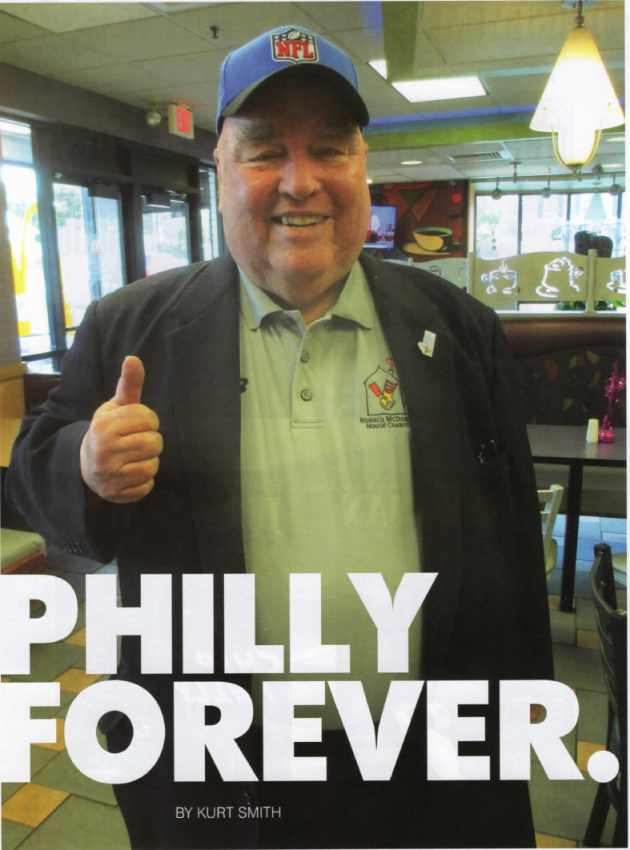
Philly Forever
Jim Murray was the Eagles GM who persuaded Dick Vermeil to come to town and lead the Eagles to a Super Bowl, but the born and raised Philadelphian’s impact still today reaches much farther than a football field.
Nearly half a century after an incident involving Santa Claus and snowballs at an Eagles game…you may have read about it…the City of Brotherly Love still today has a reputation for hideous monsters posing as sports fans.
One can imagine how, just eight years after that incident, it was enough to give a champion college football coach pause before taking a head coaching job in Philly.
Fortunately for all of us, Jim Murray, the Eagles’ general manager at the time, is prone to occasional moments of prescience.
“Vermeil’s very intense, very thorough. I remember inviting him to the Beverly Hills hotel, he answered the phone and hung up, thanks but no thanks. And then the phone rang ten minutes later and it was him.
“During the interview, he stopped and said, Jimmy, can I ask you a question? I said sure, that’s why I’m here. ‘Why would I come to Philadelphia?’ I said, what does that mean? He said, well I’ve been there, I was the special teams coach for George Allen and the Rams, those fans!
“I said Coach, I’m gonna be Jeremiah. I’m gonna be the prophet. I’m gonna tell you something.
“You come to Philadelphia and we hire you, and these three things will happen. Not only will you move to Philadelphia, you’ll bring your family, and you’ll stay there the rest of your life. You’ll never leave, and you’ll become a household word, no matter what else you do in your life.”
One could argue Vermeil has wanted to prove Murray right ever since, but it would have been a pretty big commitment if he didn’t like the area a little bit.
“Hiring the coach…that was the moment. You’re all in. If you hire the wrong guy, game over. People really, really care. The sports guys know that. Sports can change your life.
“And he is Philly. When he won the Super Bowl in St. Louis, Blue Cross had a big billboard. They didn’t even have his name on it. They just had him, congratulations on winning the Super Bowl. He became Philly.”
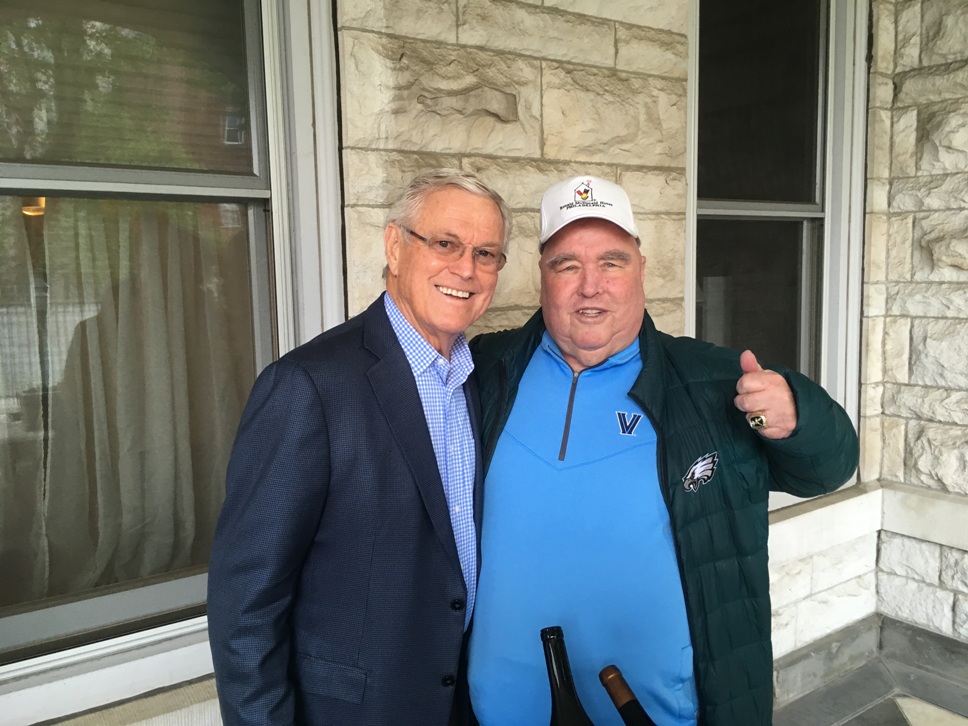
Dick Vermeil and Jim Murray, two great representatives of Philadelphia.
(photo courtesy of Jim Murray.)
Jim Murray will tell you that he was probably the youngest GM in the NFL whose father didn’t own the team. He was a sports information director at Villanova when he was told about an opening as a publicist for the Eagles.
Murray was happy at Villanova…he claimed to be the richest guy in the world despite a vow of poverty…but applied halfheartedly for the position at the Eagles anyway. He got the job. Five years later, Leonard Tose fired GM Pete Retzlaff and promoted Murray. “I wasn’t afraid to look Leonard in the eye and tell him what I thought about anything, and he hired me to be the GM.”
It turned out to be a wise choice…Murray found the right words to persuade Vermeil, after all…but Murray was also a great organizer, and thanks partly to him, a house at 4032 Spruce Street received a makeover and became a place where emotionally drained parents of sick children could rest. Today there 365 Ronald McDonald Houses in 42 countries.
That all started when former Eagle Fred Hill asked his neighbor Stan Lane to organize a fundraiser to help Hill’s daughter, who had been diagnosed with leukemia.
“Eagles Fly For Leukemia’s first event was this big dinner. Stan put on a bash, really good stuff. Leonard says, get Murray over here. He said, check it out.
“I went to see Kim Hill’s doctor, the old St. Chris’s. He said there’s a woman, her name is Dr. Audrey Evans, she’s at the Children’s Hospital of Philadelphia.”
Dr. Evans didn’t know what a Philadelphia Eagle was…she didn’t even own a television…so Murray had to explain that the owner had money and wanted to help. The two met with Tose.
“She said, we need these rooms called life islands. We give kids chemo, radiation, they have to be in a sterile environment. And he’s going, all right, how much? She says $50,000. How many rooms? Two. That’s $100,000. But Leonard, he was all in. He said, how much for the whole floor? And she didn’t hesitate, she said $1 million. And he didn’t hesitate. He said, I’ll tell you what, the Eagles pledge a million dollars. Jimmy will raise it.
“Are you kidding me? I have no clue, oh, what the …!”
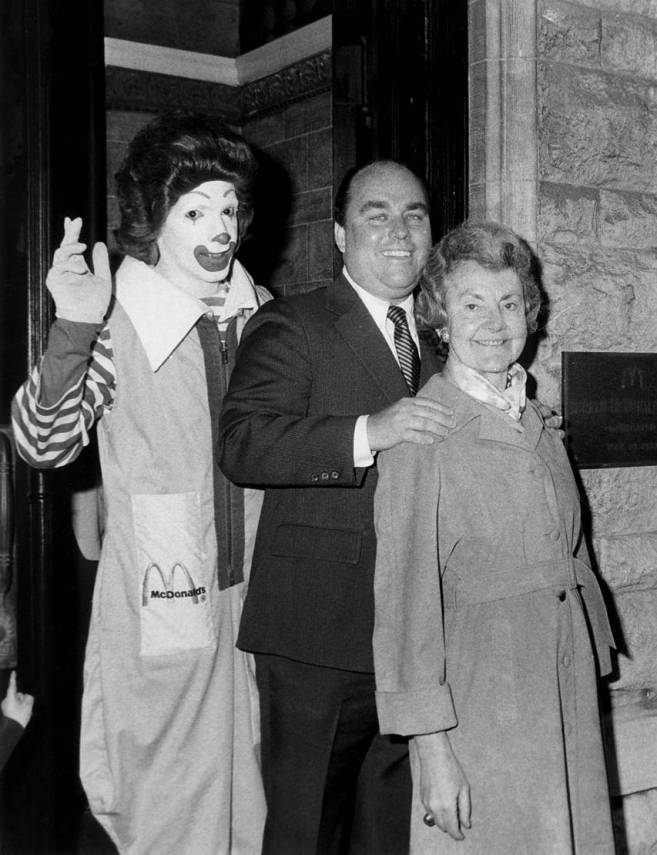
Murray with Dr. Aubrey Evans and the iconic mascot. (photo courtesy of Jim Murray.)
Murray’s first idea, a telephone fundraiser during a televised game against the 49ers, raised a grand total of $1,800. The Eagles did a bit better with a telethon following that, raising $125,000, which Murray presented to Dr. Evans at the blue line of the Spectrum.
“The most amazing thing was, I just wanted to get her off my back! And in the most beautiful words that only a woman can say, she says well that’s great! Do you know what else we need?
“I said, we’re in for a mil, here’s a buck and a quarter, what else do you need?
“That’s where the House was born. She said, do you know what happens when I tell a family their child has this disease? They don’t hear one more word I say. They come from all over the world to this hospital. If we could get a room at the YMCA, something like that.
“I said, no, no. This is Philly. We’re the old neighborhood, we’re poor. We took care of everybody. You need a house.”
Murray made phone calls to ad execs and McDonald’s regional managers, who offered donations from sales of the new green milkshakes and in turn asked for the House to be named after the new clown mascot.
“God’s hand was in that,” Murray says, “because naming it after Ronald, the kid’s not afraid to walk through the door. One freezing night I was waiting for a ride outside, Ronald’s statue is in the front yard, and this man pulls up from Tennessee. Seven kids, I didn’t even know which kid was sick. They all were like, he’s in there!
“I love that it’s a Philly story. I love that Ray Kroc, Frank Rizzo are all standing there, (former Eagle) John Canuso, his kids are there, renovated the second house. All these things…the planets lined up. You can’t put limits on God, prayer, or the power of sports for good.”
Murray frequently talks about life coming full circle. Eagles fans may remember the hiring of Dick Vermeil, the impossible story of Vince Papale, and the Super Bowl appearance during his tenure. When Murray reflects, though, it’s rarely if ever about victories on a football field. It’s the continued success of the Ronald McDonald House, the lives saved by Eagles Fly For Leukemia, and Vermeil hosting fundraisers with former players still talking about what Coach meant to them. Vermeil adopted Philly as his home; the man who predicted that he would knew exactly why.
He has too many stories to fit into a 1,300-word article…Murray is currently writing a book with “McMiracle” as a working title…but they all revolve around that theme. He never stops marveling at the impact of sports, and the kind toughness of the city where he grew up.
“I never get used to it. I could tell you story after story,” he reflects fondly. “You talk about sports, playing with pain, when you see what these families go through. To me, it’s the Rocky statue. It’s Vince Papale, it’s Invincible. You don’t forget your roots, you don’t forget where you grew up. I don’t think it’s complicated. I think we make it complicated.
“I have been lucky enough to be a little part of it. My book could never get finished. Most of the stories will never be written. And they won’t all be happy endings.
“But you know what? Everybody will be pulling for them.”
Photo credit: Ohio Redevelopment Projects – ODSA on Best Running / CC BY

Proud To Be New Jersey – Steve Trevelise
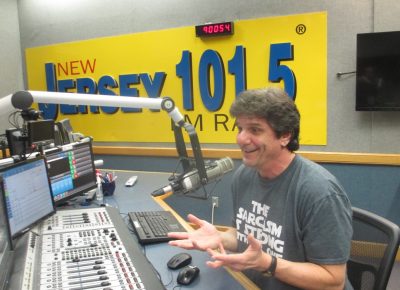
I met Steve Trevelise many years ago at a bar, and years later he featured me on his NJ 101.5 show to talk ballparks. He represents the good side of Jersey.
I interviewed him for the Spring 2018 issue of JerseyMan; you can read the article on their website here or view the magazine article here.
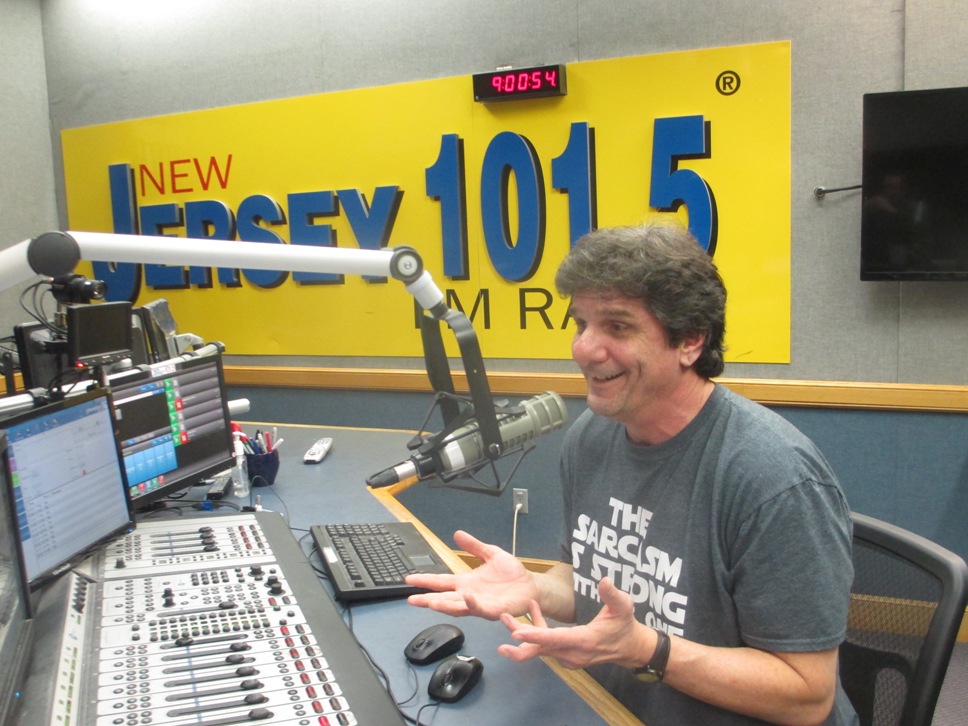
Steve Trevelise, on the station that belongs to NJ.
Proud To Be New Jersey
Union City man Steve Trevelise’s Jersey accent has been heard by New Jersey and Philadelphia residents for many years. And he has no desire to be anywhere else.
Shortly following the 7:00 PM news break, a brief snippet of Blondie’s “Union City Blue” plays. It’s soon accompanied by Steve Trevelise’s enthusiastic voice bidding NJ 101.5 listeners another great evening.
Trev then spends four hours jabbering “about things that drive me crazy”, with equally passionate Garden State natives on the phone lines. Fortunately there’s no shortage of topics. Our politicians alone are a bottomless source of insanity.
At week’s end, the seasoned veteran of the airwaves crosses the Delaware and pulls an overnight at WIP, talking Philly sports from 2:00-5:00 AM each Saturday. From the perspective of a Giants fan. Somehow, he manages to emerge from the studio free of visible blood stains.
Growing up in New Jersey has a way of preparing people for uncomfortable situations. As a Union City native, Steve Trevelise knows timidity doesn’t fly here. But it’s the rare caller to his show that hangs up seething. Trevelise is a genuinely nice guy, who articulates his opinion in a thoughtful way.
Say for example, his take on the NFL anthem controversy.
“The whole protest was ill-conceived. It was a bad idea. If you look at the greatest civil rights marches, Martin Luther King, the march on Washington, it’s all about the cause. By taking a knee for the national anthem, the players confuse the issue. Now they spend more time explaining: ‘We’re not disrespecting the military.’
“If they had said, ‘in every NFL city on Saturday night, we’re gonna hold a rally. We’re gonna have celebrities go on, have players talk about the cause, we’re gonna sell tickets for 50 bucks. We’re gonna take that money and put it into a pool, and then for every case of police brutality or racial inequality you bring to us, that we examine and see that this is real, we will use that money to fight for you.’
“Now you’ve done something, and it’s away from the game. As opposed to football players taking a knee…it is disrespectful, and that’s where it gets lost.”
After Trev tells you what he thinks, call in and have at it with him…without fear of typical ratings-driven condescension.
“It’s really hard to get people to call a radio station. How often do you call a radio station? If you listen to my show, there’s an intimacy, like a ball-busting. We go back and forth, it’s a camaraderie. That, I think, is what makes it work.
“I would never degrade a listener or call him names, because we’re all hanging out, we’re all friends, and I appreciate the fact that you took the time to call my show. I don’t come off as ‘I know more than you do.’ I come off as ‘I believe this, tell me why I should, tell me why I shouldn’t.’ And then the caller calls and says ‘you rock’ or ‘you suck.’”
Ideology aside, the lifelong Giants fan is happy for the long-suffering Eagles faithful.
“I have a relationship with Eagles fans unlike any other Giants fan, because I talk to them every week. For years I’ve been hearing the anxiety in their voices, the frustration of the waiting. I sincerely congratulate them, especially when it’s so easy to root for this team with all their back stories.
“Of course next year, the rivalry picks up where it left off.”
As Jersey as Steve Trevelise is, he’s anything but the rude, surly stereotype. But he understands why we all get a little aggravated sometimes. He did spend years reading the traffic reports.
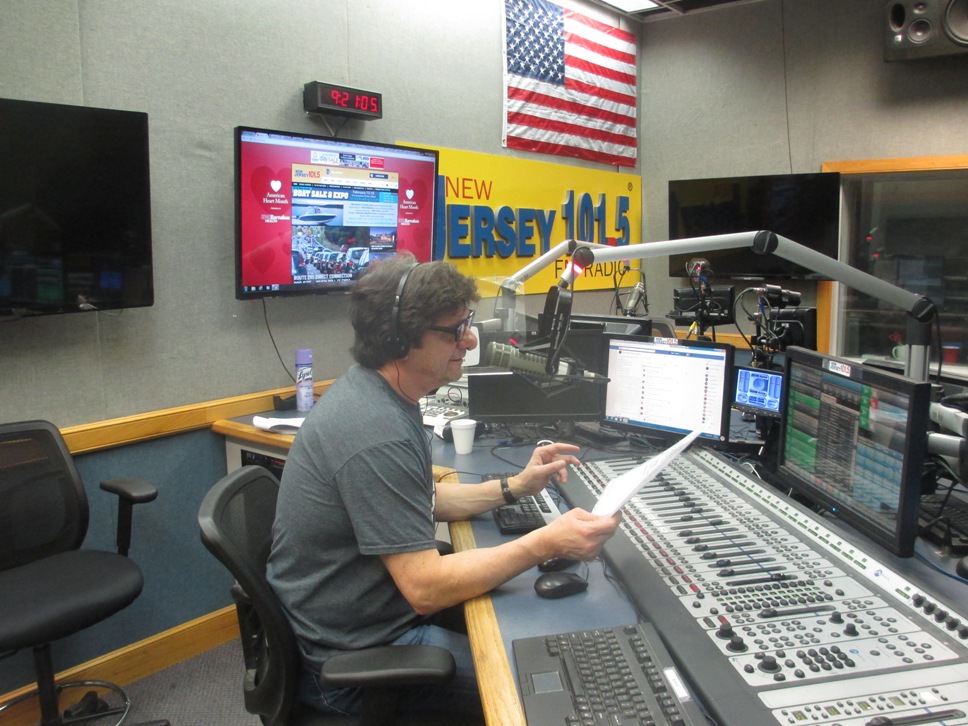
Trevelise spent years in Philly repeating “traffic is backed up from Academy through Girard…”
Longtime Philly radio listeners are familiar with Steve Trevelise. He’s a longtime area presence who’s done traffic and sports updates for Howard Eskin, Tom Joyner, Gina Preston, Nancy Glass, and Glen Kalina among others, before landing at NJ 101.5 in 2011. He’s the kind of guy that never hurt anyone’s Arbitron showing.
Most memorably, he was a reporter on the Howard Stern Show on WYSP, as Stern directed nonstop scorched-earth vitriol at WMMR morning rival John DeBella. You may remember the stark contrast of Trevelise’s friendly tone, smoothly delivering sports updates following thunderous segments of Stern ferocity. He might have been the perfect announcer to interrupt the War of The Worlds broadcast.
Trevelise describes his WYSP years as being a “local presence” for a New York-based show. He remembers initial resistance to bringing Stern to Philly…not because of the daily controversy, but out of concern that Howard was too New York for Philadelphia.
He recalls how Stern turned that into an advantage: he appealed to our city’s love of a street fighting underdog.
“What made Howard work in Philadelphia, was getting Howard to talk about Philadelphia. It wasn’t ‘eh, Philadelphia, second class citizens’. He found a tool to make Philadelphia work. That tool was The Zookeeper, ‘we are at war with the Zookeeper’. Philly could buy into that. And then it became, ‘how’s he going to torture DeBella today?’
“What’s funny about it is, eventually DeBella comes to work at WYSP!”
Trevelise has been a fan of Stern since the WNBC years. “The great thing about Howard was that he was so controversial, but he was entertaining, and he’s real. I got paid to listen to the Howard Stern show. Something would happen during the day, and it’d be like, ‘I can’t wait to go to work tomorrow and see what Howard’s gonna say about this.’
“And I love when I’m on the radio at night, and something will happen and I’ll be talking about it, and people go, ‘I couldn’t wait to hear what you had to say about this!’”
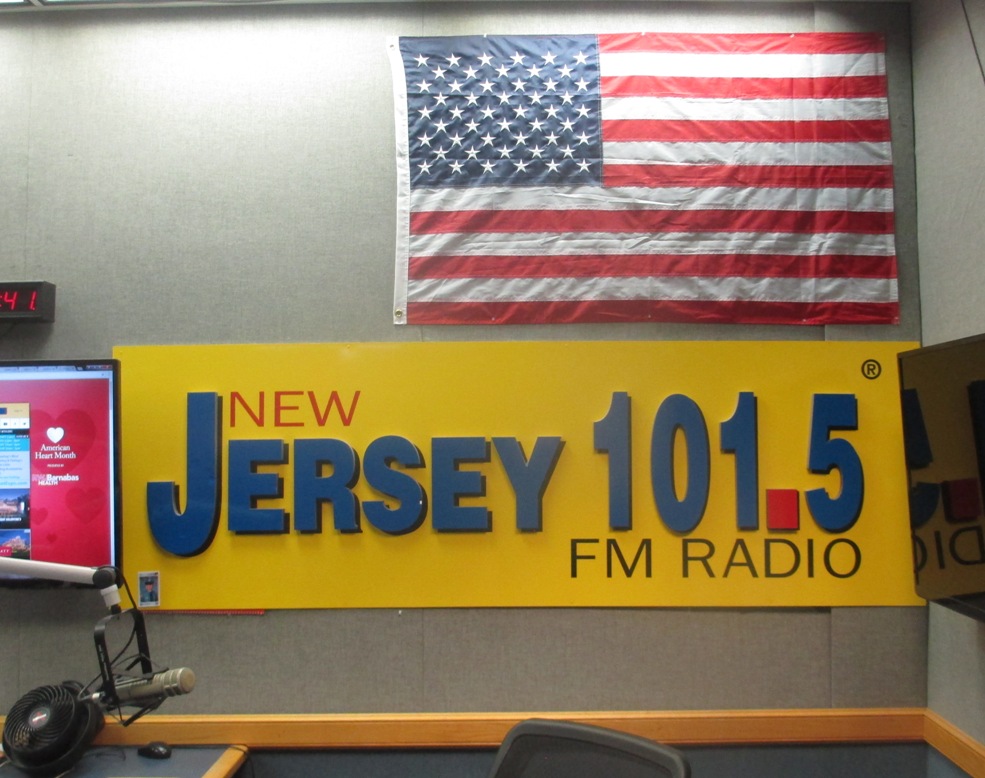
Local radio still matters.
In an era of satellite radio and syndicated stars, radio is still local. It’s more than just traffic and weather, but as it turns out, that’s a pretty big part of it.
As a former director for Shadow Traffic and later Clear Channel traffic for Philly stations, Trevelise never ran out of work. But since those days, things have gotten pretty congested in the Jersey suburbs, too. After decades of migration from New York and Philadelphia, there’s now a need for an entire state to have its own traffic problems accounted for.
“I remember from giving traffic reports in the old days, New Jersey was always the afterthought. Philadelphia traffic, here’s all the roads in Delaware County, then New Jersey: 42, Turnpike, there you go. Here’s all the New York roads, then New Jersey: Turnpike, Parkway, and we’d go off. Every 15 minutes, you can turn on New Jersey 101.5 and you’re going to get the traffic report for exactly where you are. I-287, Route 9, Route 35, the Parkway, whatever.”
But daily traffic info is nothing compared to a Jersey-centric station’s impact in a storm that devastated our famous coastline.
“Hurricane Sandy galvanized 101.5 with listeners. I’ve never in my life, including during the Stern show, seen anything like it. I was on the air the night Sandy happened, and I remember Christie came in for ‘Ask The Governor’. They were telling him don’t come in, and he said no, this is the place where I can reach everybody. Because everybody was listening.
“Christie comes in at 7:00, I follow him at eight and I was supposed to be there until midnight. Ray Rossi was there at the time, he was gonna follow me. At about ten or eleven, we lose the transmitter. So now we had nothing but the Internet, and we have to stay on because we’re online. At 3:00, we lose the phones. Ray and I are talking recipes for tomato sauce. We literally had nothing. But people are continuing to call in, because they’re getting us.
“For the next three or four months, we had people with no power, literally listening to us with batteries in the radio. Imagine, in 2012, you’re a radio station and you’re the only game in town. There’s no television, there’s no Internet, there is nothing else but you.
“To this day people thank me. They say hey man, thank you for getting me through Sandy. They still remember.”
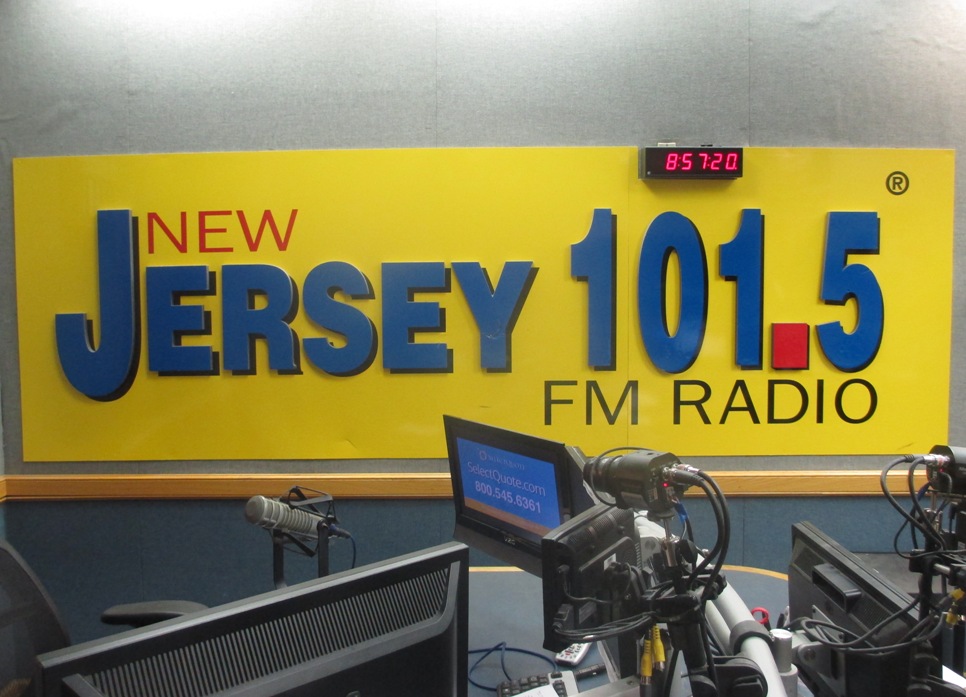
Not New York. Not Philadelphia.
People tune in to NJ 101.5 for traffic and weather. They stick around for ball-busting camaraderie with Jersey lifers like Steve Trevelise. To him, it’s a communal thing.
“We’re the only radio station that, when you turn us on, you’re hearing people talking the way you do, talking about things that you care about, in the state that you live in. This is ours, it’s not New York, it’s not Philadelphia.
“101.5 is New Jersey. I am New Jersey. I was born in Union City, I’ve lived all over the state, I would never move. I genuinely love it here. There is a realism, an honesty about New Jersey, and that’s what I bring to my show.
“If someone said to me, what do you want to do, I couldn’t write this better. I’m proud that I get to talk about a place that I love, in front of children who I love. And that they get to see it.”
The Comedy Stylings of Steve Trevelise
In addition to his radio career, Trevelise has dabbled in comedy, performing as an opening act for the likes of Robert Klein, Pat Cooper and Bill Hicks.
His first standup act was opening for Gabe Kaplan, of Welcome Back Kotter fame. “Remember the end of Welcome Back Kotter, when he’d tell the joke? That was his act!”
Trevelise became successful enough in the comedy world to open two of his own comedy clubs. The Coffee-Dot-Comedy Club in Sea Isle City was a success…it featured dishes named after radio stars and $1 a minute Internet service in the days before wi-fi. Later he took over the comedy club in the Cherry Hill Crowne Plaza, Rascals, and renamed it Sarcasm.
It was successful for about five years, but as Trevelise says, it’s tough when you’re living on the door. “I went through something like seven general managers in five years. I got guys sending fruit baskets to the comics, I got guys trying to charge me rent,” he says with a chuckle.
But he’s still doing standup comedy events, and now he brings his radio friends along. “I’ll go out and put shows together and do like corporate fundraising, as well as doing road shows. I take Dennis and Judi out on the road, and also Bill Spadea, and so the 101.5 guys are all able to entertain people, which is great.”
If you’d like to Steve and his gang of NJ 101.5 radio costars at an event, you can check Trevelise’s page on the radio station’s website.
Or you can friend him on Facebook for updates…he readily accepts most friend requests, but you have to catch him when he’s sitting at 4,999.
“Your limit is 5,000. Anyone who tries to friend me, they kick it back.”

